An Analysis of the Effect of TRIPS on Global Trade in Pharmaceuticals
VerifiedAdded on 2022/08/21
|17
|5110
|20
Essay
AI Summary
This essay delves into the intricate effects of the Trade-Related Aspects of Intellectual Property Rights (TRIPS) Agreement on the global pharmaceutical industry. It explores how the TRIPS agreement, established by the World Trade Organization (WTO), mandates minimum standards for intellectual...
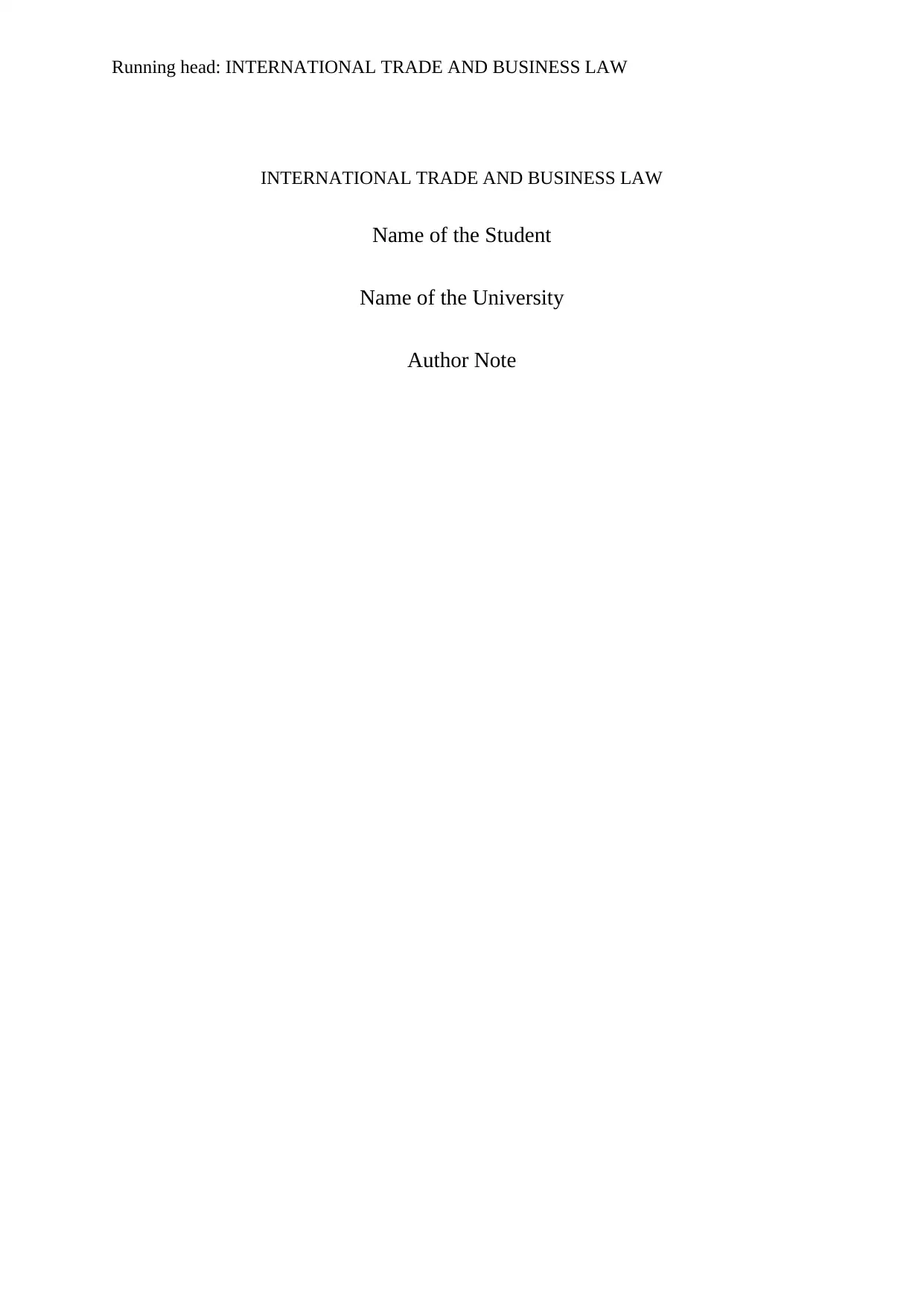
Running head: INTERNATIONAL TRADE AND BUSINESS LAW
INTERNATIONAL TRADE AND BUSINESS LAW
Name of the Student
Name of the University
Author Note
INTERNATIONAL TRADE AND BUSINESS LAW
Name of the Student
Name of the University
Author Note
Paraphrase This Document
Need a fresh take? Get an instant paraphrase of this document with our AI Paraphraser
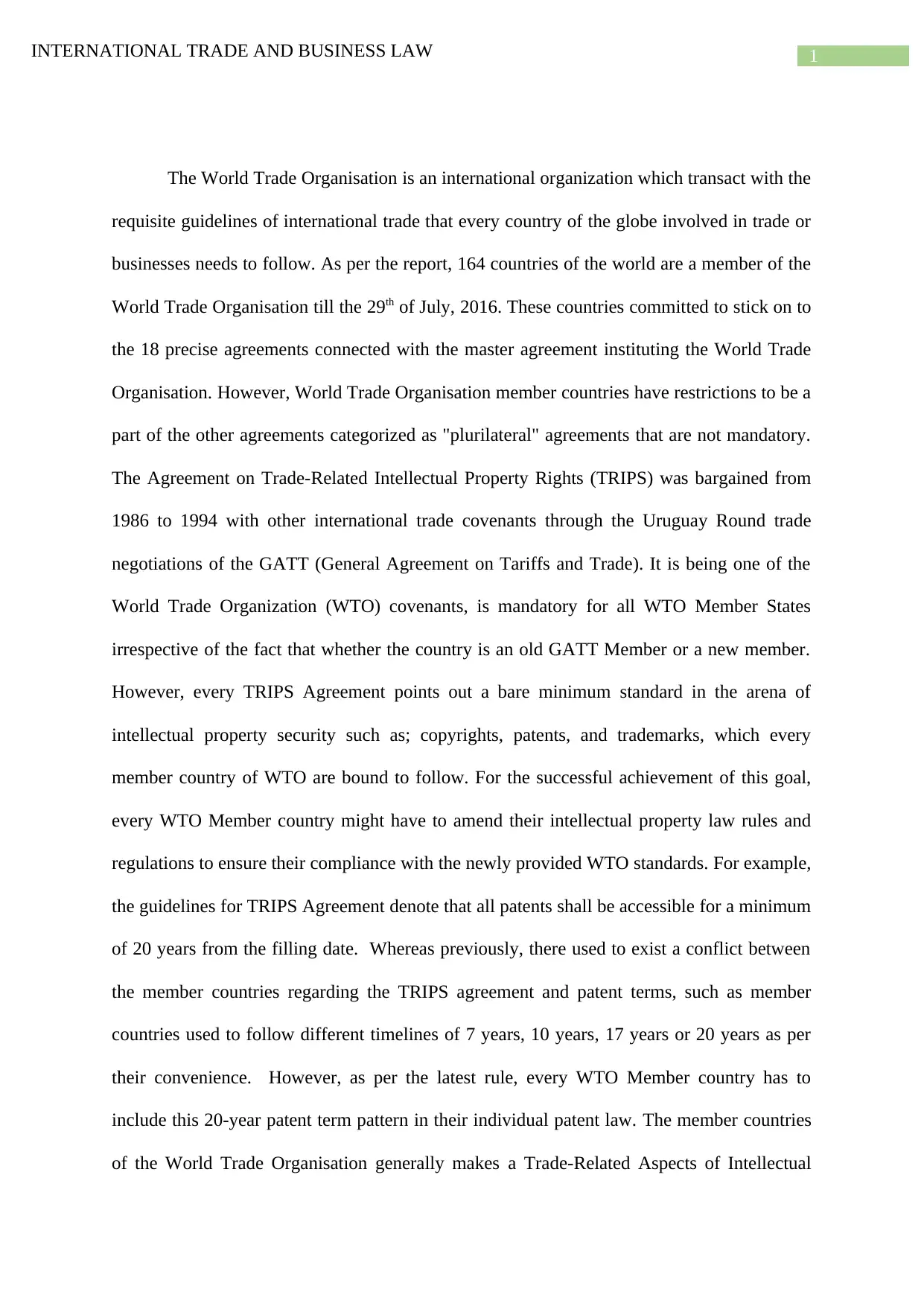
1INTERNATIONAL TRADE AND BUSINESS LAW
The World Trade Organisation is an international organization which transact with the
requisite guidelines of international trade that every country of the globe involved in trade or
businesses needs to follow. As per the report, 164 countries of the world are a member of the
World Trade Organisation till the 29th of July, 2016. These countries committed to stick on to
the 18 precise agreements connected with the master agreement instituting the World Trade
Organisation. However, World Trade Organisation member countries have restrictions to be a
part of the other agreements categorized as "plurilateral" agreements that are not mandatory.
The Agreement on Trade-Related Intellectual Property Rights (TRIPS) was bargained from
1986 to 1994 with other international trade covenants through the Uruguay Round trade
negotiations of the GATT (General Agreement on Tariffs and Trade). It is being one of the
World Trade Organization (WTO) covenants, is mandatory for all WTO Member States
irrespective of the fact that whether the country is an old GATT Member or a new member.
However, every TRIPS Agreement points out a bare minimum standard in the arena of
intellectual property security such as; copyrights, patents, and trademarks, which every
member country of WTO are bound to follow. For the successful achievement of this goal,
every WTO Member country might have to amend their intellectual property law rules and
regulations to ensure their compliance with the newly provided WTO standards. For example,
the guidelines for TRIPS Agreement denote that all patents shall be accessible for a minimum
of 20 years from the filling date. Whereas previously, there used to exist a conflict between
the member countries regarding the TRIPS agreement and patent terms, such as member
countries used to follow different timelines of 7 years, 10 years, 17 years or 20 years as per
their convenience. However, as per the latest rule, every WTO Member country has to
include this 20-year patent term pattern in their individual patent law. The member countries
of the World Trade Organisation generally makes a Trade-Related Aspects of Intellectual
The World Trade Organisation is an international organization which transact with the
requisite guidelines of international trade that every country of the globe involved in trade or
businesses needs to follow. As per the report, 164 countries of the world are a member of the
World Trade Organisation till the 29th of July, 2016. These countries committed to stick on to
the 18 precise agreements connected with the master agreement instituting the World Trade
Organisation. However, World Trade Organisation member countries have restrictions to be a
part of the other agreements categorized as "plurilateral" agreements that are not mandatory.
The Agreement on Trade-Related Intellectual Property Rights (TRIPS) was bargained from
1986 to 1994 with other international trade covenants through the Uruguay Round trade
negotiations of the GATT (General Agreement on Tariffs and Trade). It is being one of the
World Trade Organization (WTO) covenants, is mandatory for all WTO Member States
irrespective of the fact that whether the country is an old GATT Member or a new member.
However, every TRIPS Agreement points out a bare minimum standard in the arena of
intellectual property security such as; copyrights, patents, and trademarks, which every
member country of WTO are bound to follow. For the successful achievement of this goal,
every WTO Member country might have to amend their intellectual property law rules and
regulations to ensure their compliance with the newly provided WTO standards. For example,
the guidelines for TRIPS Agreement denote that all patents shall be accessible for a minimum
of 20 years from the filling date. Whereas previously, there used to exist a conflict between
the member countries regarding the TRIPS agreement and patent terms, such as member
countries used to follow different timelines of 7 years, 10 years, 17 years or 20 years as per
their convenience. However, as per the latest rule, every WTO Member country has to
include this 20-year patent term pattern in their individual patent law. The member countries
of the World Trade Organisation generally makes a Trade-Related Aspects of Intellectual
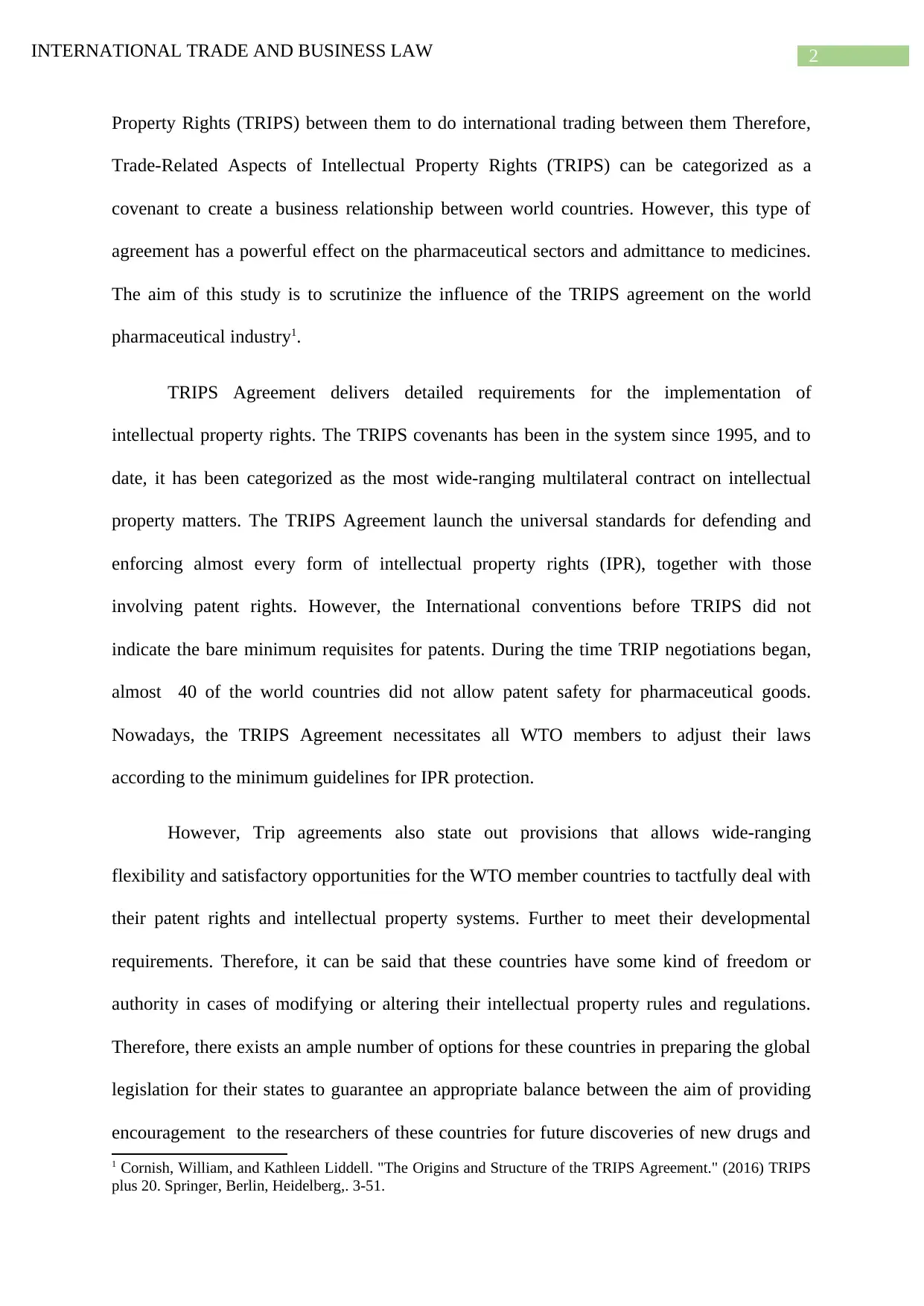
2INTERNATIONAL TRADE AND BUSINESS LAW
Property Rights (TRIPS) between them to do international trading between them Therefore,
Trade-Related Aspects of Intellectual Property Rights (TRIPS) can be categorized as a
covenant to create a business relationship between world countries. However, this type of
agreement has a powerful effect on the pharmaceutical sectors and admittance to medicines.
The aim of this study is to scrutinize the influence of the TRIPS agreement on the world
pharmaceutical industry1.
TRIPS Agreement delivers detailed requirements for the implementation of
intellectual property rights. The TRIPS covenants has been in the system since 1995, and to
date, it has been categorized as the most wide-ranging multilateral contract on intellectual
property matters. The TRIPS Agreement launch the universal standards for defending and
enforcing almost every form of intellectual property rights (IPR), together with those
involving patent rights. However, the International conventions before TRIPS did not
indicate the bare minimum requisites for patents. During the time TRIP negotiations began,
almost 40 of the world countries did not allow patent safety for pharmaceutical goods.
Nowadays, the TRIPS Agreement necessitates all WTO members to adjust their laws
according to the minimum guidelines for IPR protection.
However, Trip agreements also state out provisions that allows wide-ranging
flexibility and satisfactory opportunities for the WTO member countries to tactfully deal with
their patent rights and intellectual property systems. Further to meet their developmental
requirements. Therefore, it can be said that these countries have some kind of freedom or
authority in cases of modifying or altering their intellectual property rules and regulations.
Therefore, there exists an ample number of options for these countries in preparing the global
legislation for their states to guarantee an appropriate balance between the aim of providing
encouragement to the researchers of these countries for future discoveries of new drugs and
1 Cornish, William, and Kathleen Liddell. "The Origins and Structure of the TRIPS Agreement." (2016) TRIPS
plus 20. Springer, Berlin, Heidelberg,. 3-51.
Property Rights (TRIPS) between them to do international trading between them Therefore,
Trade-Related Aspects of Intellectual Property Rights (TRIPS) can be categorized as a
covenant to create a business relationship between world countries. However, this type of
agreement has a powerful effect on the pharmaceutical sectors and admittance to medicines.
The aim of this study is to scrutinize the influence of the TRIPS agreement on the world
pharmaceutical industry1.
TRIPS Agreement delivers detailed requirements for the implementation of
intellectual property rights. The TRIPS covenants has been in the system since 1995, and to
date, it has been categorized as the most wide-ranging multilateral contract on intellectual
property matters. The TRIPS Agreement launch the universal standards for defending and
enforcing almost every form of intellectual property rights (IPR), together with those
involving patent rights. However, the International conventions before TRIPS did not
indicate the bare minimum requisites for patents. During the time TRIP negotiations began,
almost 40 of the world countries did not allow patent safety for pharmaceutical goods.
Nowadays, the TRIPS Agreement necessitates all WTO members to adjust their laws
according to the minimum guidelines for IPR protection.
However, Trip agreements also state out provisions that allows wide-ranging
flexibility and satisfactory opportunities for the WTO member countries to tactfully deal with
their patent rights and intellectual property systems. Further to meet their developmental
requirements. Therefore, it can be said that these countries have some kind of freedom or
authority in cases of modifying or altering their intellectual property rules and regulations.
Therefore, there exists an ample number of options for these countries in preparing the global
legislation for their states to guarantee an appropriate balance between the aim of providing
encouragement to the researchers of these countries for future discoveries of new drugs and
1 Cornish, William, and Kathleen Liddell. "The Origins and Structure of the TRIPS Agreement." (2016) TRIPS
plus 20. Springer, Berlin, Heidelberg,. 3-51.
You're viewing a preview
Unlock full access by subscribing today!
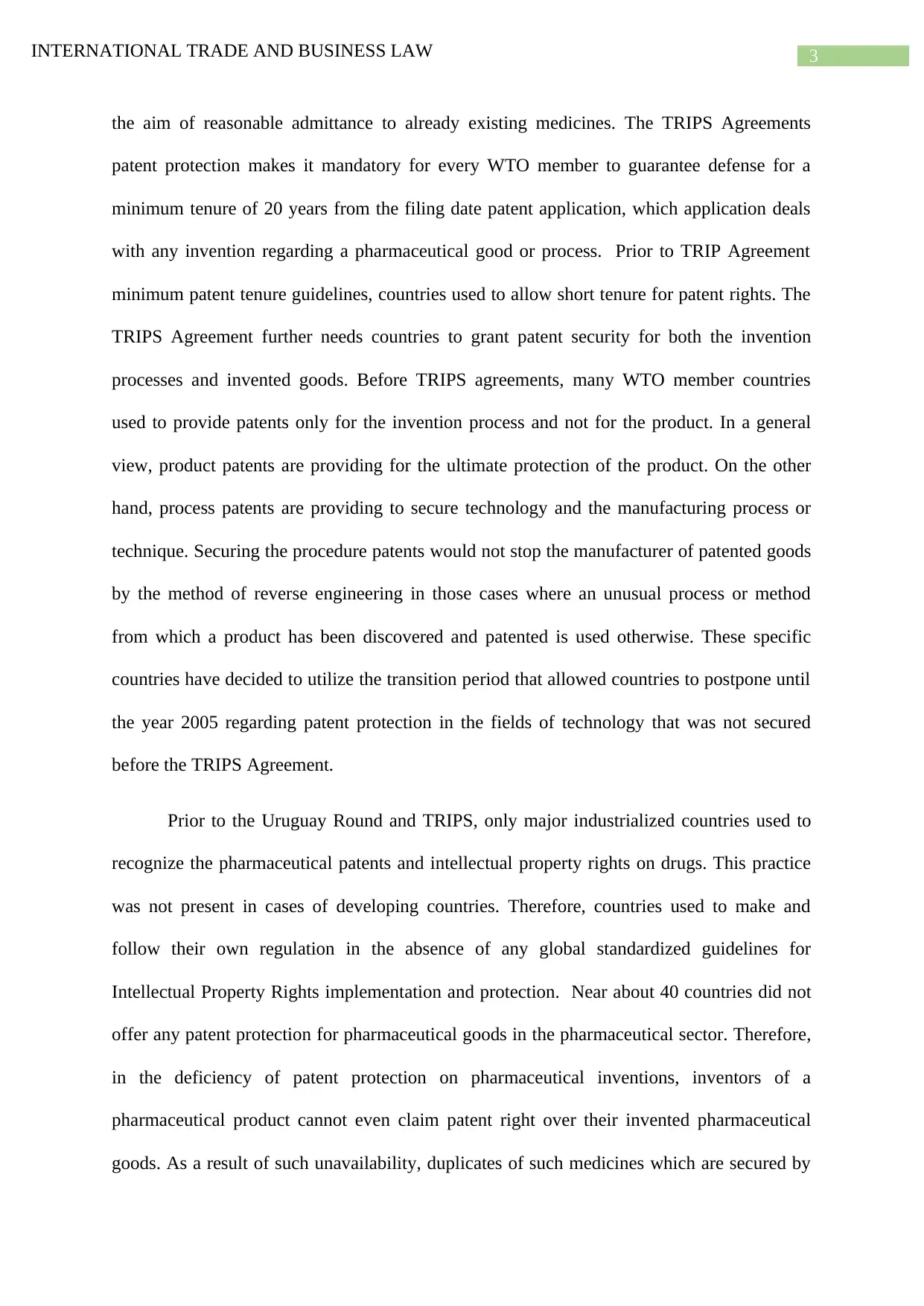
3INTERNATIONAL TRADE AND BUSINESS LAW
the aim of reasonable admittance to already existing medicines. The TRIPS Agreements
patent protection makes it mandatory for every WTO member to guarantee defense for a
minimum tenure of 20 years from the filing date patent application, which application deals
with any invention regarding a pharmaceutical good or process. Prior to TRIP Agreement
minimum patent tenure guidelines, countries used to allow short tenure for patent rights. The
TRIPS Agreement further needs countries to grant patent security for both the invention
processes and invented goods. Before TRIPS agreements, many WTO member countries
used to provide patents only for the invention process and not for the product. In a general
view, product patents are providing for the ultimate protection of the product. On the other
hand, process patents are providing to secure technology and the manufacturing process or
technique. Securing the procedure patents would not stop the manufacturer of patented goods
by the method of reverse engineering in those cases where an unusual process or method
from which a product has been discovered and patented is used otherwise. These specific
countries have decided to utilize the transition period that allowed countries to postpone until
the year 2005 regarding patent protection in the fields of technology that was not secured
before the TRIPS Agreement.
Prior to the Uruguay Round and TRIPS, only major industrialized countries used to
recognize the pharmaceutical patents and intellectual property rights on drugs. This practice
was not present in cases of developing countries. Therefore, countries used to make and
follow their own regulation in the absence of any global standardized guidelines for
Intellectual Property Rights implementation and protection. Near about 40 countries did not
offer any patent protection for pharmaceutical goods in the pharmaceutical sector. Therefore,
in the deficiency of patent protection on pharmaceutical inventions, inventors of a
pharmaceutical product cannot even claim patent right over their invented pharmaceutical
goods. As a result of such unavailability, duplicates of such medicines which are secured by
the aim of reasonable admittance to already existing medicines. The TRIPS Agreements
patent protection makes it mandatory for every WTO member to guarantee defense for a
minimum tenure of 20 years from the filing date patent application, which application deals
with any invention regarding a pharmaceutical good or process. Prior to TRIP Agreement
minimum patent tenure guidelines, countries used to allow short tenure for patent rights. The
TRIPS Agreement further needs countries to grant patent security for both the invention
processes and invented goods. Before TRIPS agreements, many WTO member countries
used to provide patents only for the invention process and not for the product. In a general
view, product patents are providing for the ultimate protection of the product. On the other
hand, process patents are providing to secure technology and the manufacturing process or
technique. Securing the procedure patents would not stop the manufacturer of patented goods
by the method of reverse engineering in those cases where an unusual process or method
from which a product has been discovered and patented is used otherwise. These specific
countries have decided to utilize the transition period that allowed countries to postpone until
the year 2005 regarding patent protection in the fields of technology that was not secured
before the TRIPS Agreement.
Prior to the Uruguay Round and TRIPS, only major industrialized countries used to
recognize the pharmaceutical patents and intellectual property rights on drugs. This practice
was not present in cases of developing countries. Therefore, countries used to make and
follow their own regulation in the absence of any global standardized guidelines for
Intellectual Property Rights implementation and protection. Near about 40 countries did not
offer any patent protection for pharmaceutical goods in the pharmaceutical sector. Therefore,
in the deficiency of patent protection on pharmaceutical inventions, inventors of a
pharmaceutical product cannot even claim patent right over their invented pharmaceutical
goods. As a result of such unavailability, duplicates of such medicines which are secured by
Paraphrase This Document
Need a fresh take? Get an instant paraphrase of this document with our AI Paraphraser
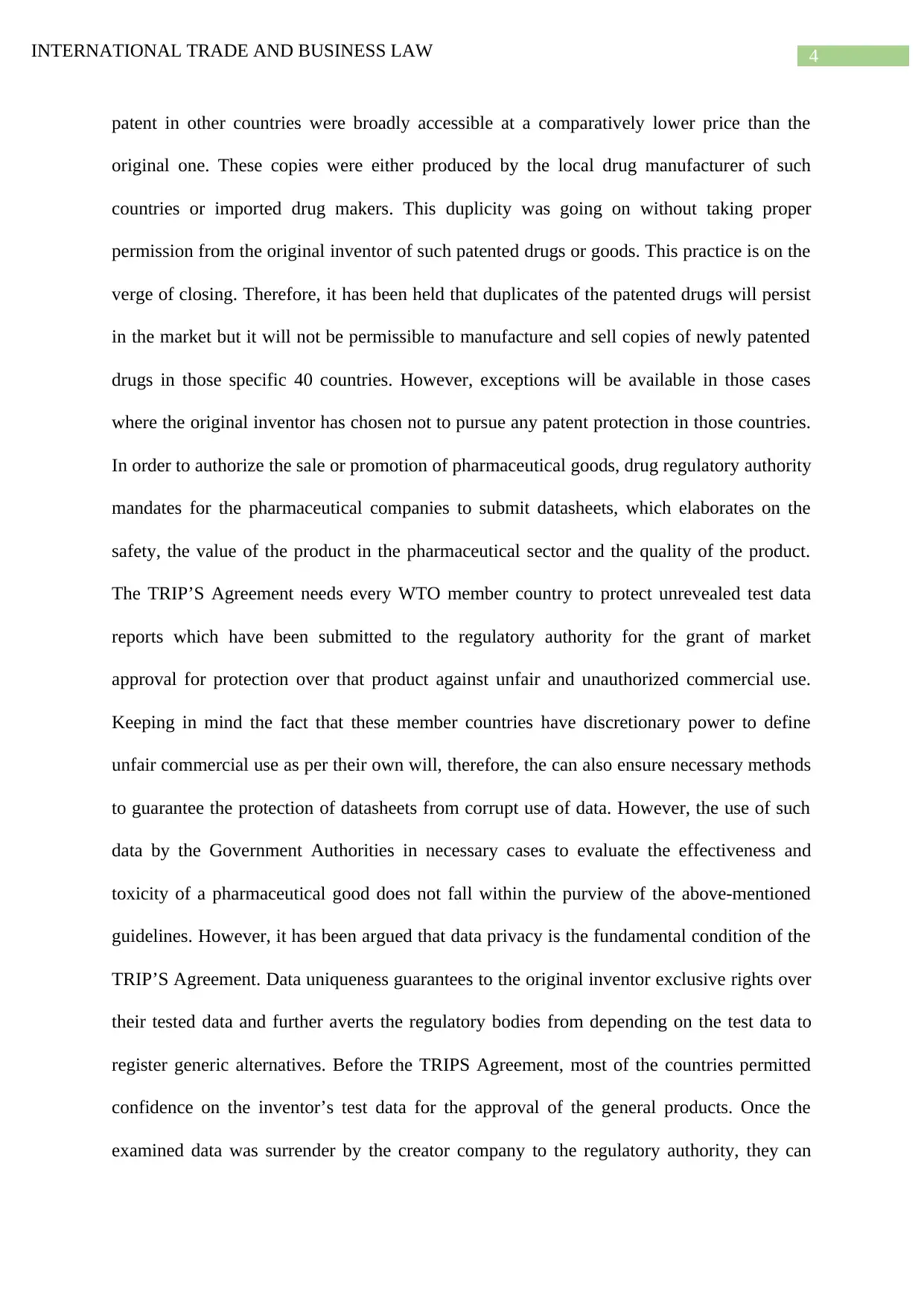
4INTERNATIONAL TRADE AND BUSINESS LAW
patent in other countries were broadly accessible at a comparatively lower price than the
original one. These copies were either produced by the local drug manufacturer of such
countries or imported drug makers. This duplicity was going on without taking proper
permission from the original inventor of such patented drugs or goods. This practice is on the
verge of closing. Therefore, it has been held that duplicates of the patented drugs will persist
in the market but it will not be permissible to manufacture and sell copies of newly patented
drugs in those specific 40 countries. However, exceptions will be available in those cases
where the original inventor has chosen not to pursue any patent protection in those countries.
In order to authorize the sale or promotion of pharmaceutical goods, drug regulatory authority
mandates for the pharmaceutical companies to submit datasheets, which elaborates on the
safety, the value of the product in the pharmaceutical sector and the quality of the product.
The TRIP’S Agreement needs every WTO member country to protect unrevealed test data
reports which have been submitted to the regulatory authority for the grant of market
approval for protection over that product against unfair and unauthorized commercial use.
Keeping in mind the fact that these member countries have discretionary power to define
unfair commercial use as per their own will, therefore, the can also ensure necessary methods
to guarantee the protection of datasheets from corrupt use of data. However, the use of such
data by the Government Authorities in necessary cases to evaluate the effectiveness and
toxicity of a pharmaceutical good does not fall within the purview of the above-mentioned
guidelines. However, it has been argued that data privacy is the fundamental condition of the
TRIP’S Agreement. Data uniqueness guarantees to the original inventor exclusive rights over
their tested data and further averts the regulatory bodies from depending on the test data to
register generic alternatives. Before the TRIPS Agreement, most of the countries permitted
confidence on the inventor’s test data for the approval of the general products. Once the
examined data was surrender by the creator company to the regulatory authority, they can
patent in other countries were broadly accessible at a comparatively lower price than the
original one. These copies were either produced by the local drug manufacturer of such
countries or imported drug makers. This duplicity was going on without taking proper
permission from the original inventor of such patented drugs or goods. This practice is on the
verge of closing. Therefore, it has been held that duplicates of the patented drugs will persist
in the market but it will not be permissible to manufacture and sell copies of newly patented
drugs in those specific 40 countries. However, exceptions will be available in those cases
where the original inventor has chosen not to pursue any patent protection in those countries.
In order to authorize the sale or promotion of pharmaceutical goods, drug regulatory authority
mandates for the pharmaceutical companies to submit datasheets, which elaborates on the
safety, the value of the product in the pharmaceutical sector and the quality of the product.
The TRIP’S Agreement needs every WTO member country to protect unrevealed test data
reports which have been submitted to the regulatory authority for the grant of market
approval for protection over that product against unfair and unauthorized commercial use.
Keeping in mind the fact that these member countries have discretionary power to define
unfair commercial use as per their own will, therefore, the can also ensure necessary methods
to guarantee the protection of datasheets from corrupt use of data. However, the use of such
data by the Government Authorities in necessary cases to evaluate the effectiveness and
toxicity of a pharmaceutical good does not fall within the purview of the above-mentioned
guidelines. However, it has been argued that data privacy is the fundamental condition of the
TRIP’S Agreement. Data uniqueness guarantees to the original inventor exclusive rights over
their tested data and further averts the regulatory bodies from depending on the test data to
register generic alternatives. Before the TRIPS Agreement, most of the countries permitted
confidence on the inventor’s test data for the approval of the general products. Once the
examined data was surrender by the creator company to the regulatory authority, they can
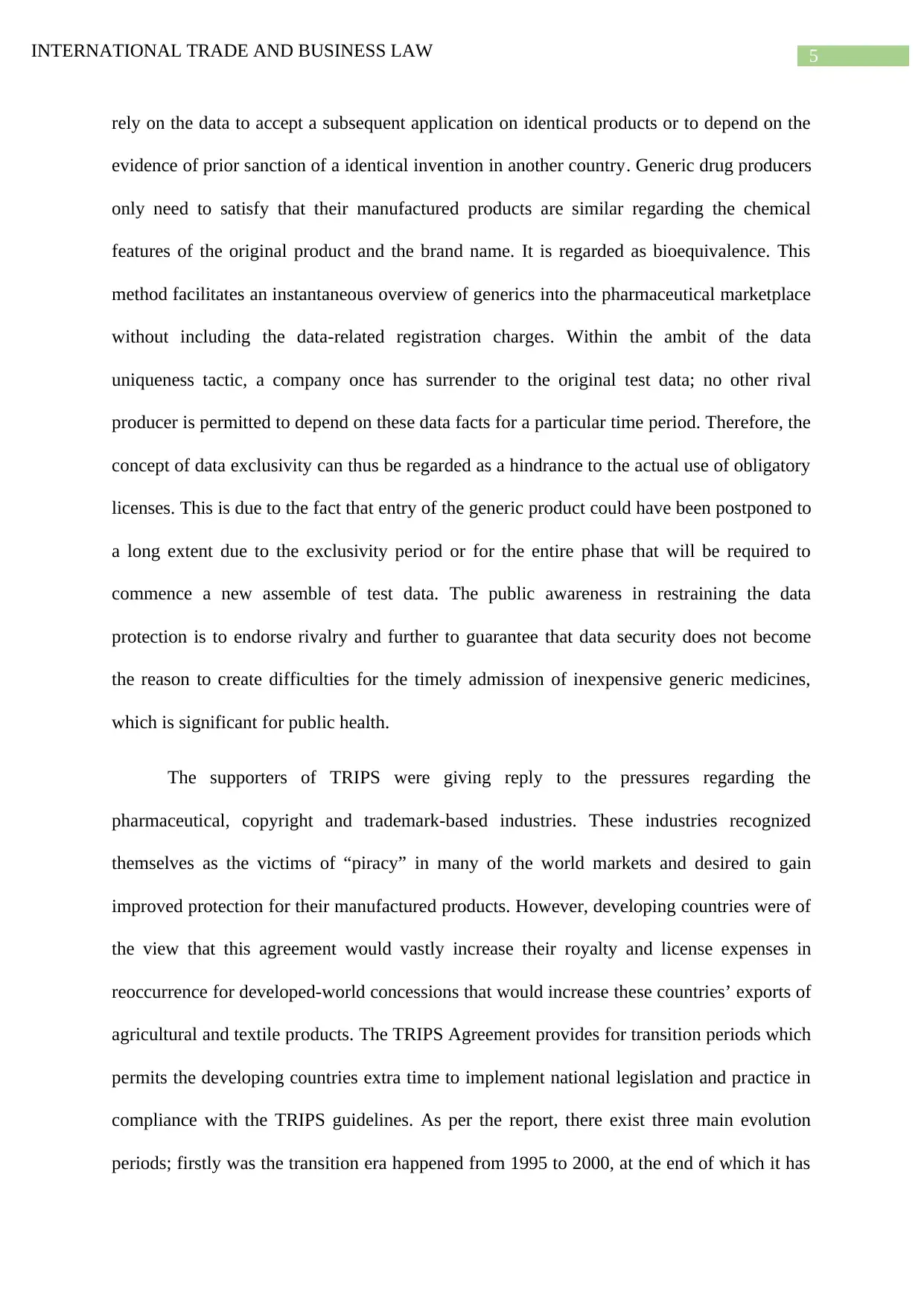
5INTERNATIONAL TRADE AND BUSINESS LAW
rely on the data to accept a subsequent application on identical products or to depend on the
evidence of prior sanction of a identical invention in another country. Generic drug producers
only need to satisfy that their manufactured products are similar regarding the chemical
features of the original product and the brand name. It is regarded as bioequivalence. This
method facilitates an instantaneous overview of generics into the pharmaceutical marketplace
without including the data-related registration charges. Within the ambit of the data
uniqueness tactic, a company once has surrender to the original test data; no other rival
producer is permitted to depend on these data facts for a particular time period. Therefore, the
concept of data exclusivity can thus be regarded as a hindrance to the actual use of obligatory
licenses. This is due to the fact that entry of the generic product could have been postponed to
a long extent due to the exclusivity period or for the entire phase that will be required to
commence a new assemble of test data. The public awareness in restraining the data
protection is to endorse rivalry and further to guarantee that data security does not become
the reason to create difficulties for the timely admission of inexpensive generic medicines,
which is significant for public health.
The supporters of TRIPS were giving reply to the pressures regarding the
pharmaceutical, copyright and trademark-based industries. These industries recognized
themselves as the victims of “piracy” in many of the world markets and desired to gain
improved protection for their manufactured products. However, developing countries were of
the view that this agreement would vastly increase their royalty and license expenses in
reoccurrence for developed-world concessions that would increase these countries’ exports of
agricultural and textile products. The TRIPS Agreement provides for transition periods which
permits the developing countries extra time to implement national legislation and practice in
compliance with the TRIPS guidelines. As per the report, there exist three main evolution
periods; firstly was the transition era happened from 1995 to 2000, at the end of which it has
rely on the data to accept a subsequent application on identical products or to depend on the
evidence of prior sanction of a identical invention in another country. Generic drug producers
only need to satisfy that their manufactured products are similar regarding the chemical
features of the original product and the brand name. It is regarded as bioequivalence. This
method facilitates an instantaneous overview of generics into the pharmaceutical marketplace
without including the data-related registration charges. Within the ambit of the data
uniqueness tactic, a company once has surrender to the original test data; no other rival
producer is permitted to depend on these data facts for a particular time period. Therefore, the
concept of data exclusivity can thus be regarded as a hindrance to the actual use of obligatory
licenses. This is due to the fact that entry of the generic product could have been postponed to
a long extent due to the exclusivity period or for the entire phase that will be required to
commence a new assemble of test data. The public awareness in restraining the data
protection is to endorse rivalry and further to guarantee that data security does not become
the reason to create difficulties for the timely admission of inexpensive generic medicines,
which is significant for public health.
The supporters of TRIPS were giving reply to the pressures regarding the
pharmaceutical, copyright and trademark-based industries. These industries recognized
themselves as the victims of “piracy” in many of the world markets and desired to gain
improved protection for their manufactured products. However, developing countries were of
the view that this agreement would vastly increase their royalty and license expenses in
reoccurrence for developed-world concessions that would increase these countries’ exports of
agricultural and textile products. The TRIPS Agreement provides for transition periods which
permits the developing countries extra time to implement national legislation and practice in
compliance with the TRIPS guidelines. As per the report, there exist three main evolution
periods; firstly was the transition era happened from 1995 to 2000, at the end of which it has
You're viewing a preview
Unlock full access by subscribing today!
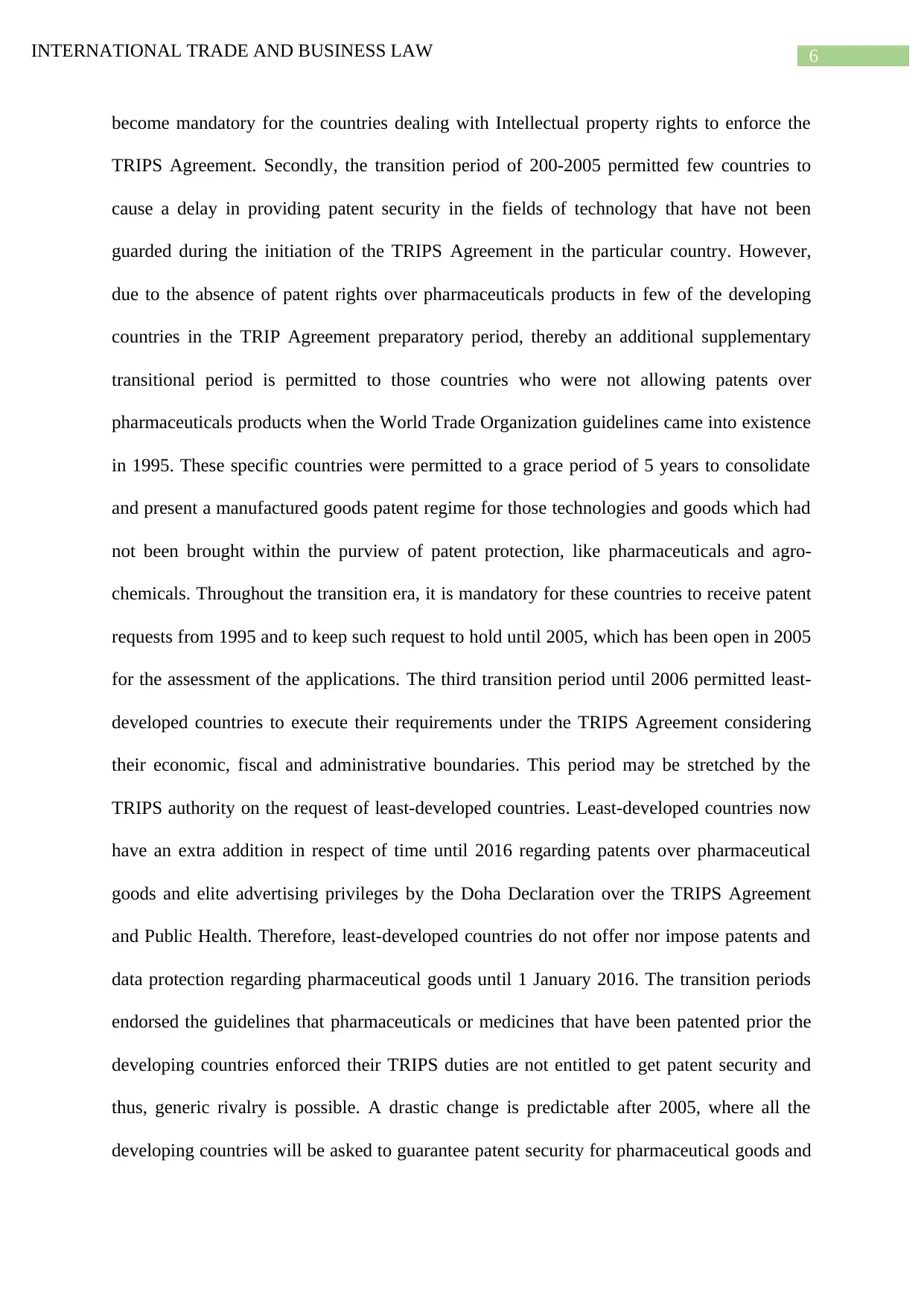
6INTERNATIONAL TRADE AND BUSINESS LAW
become mandatory for the countries dealing with Intellectual property rights to enforce the
TRIPS Agreement. Secondly, the transition period of 200-2005 permitted few countries to
cause a delay in providing patent security in the fields of technology that have not been
guarded during the initiation of the TRIPS Agreement in the particular country. However,
due to the absence of patent rights over pharmaceuticals products in few of the developing
countries in the TRIP Agreement preparatory period, thereby an additional supplementary
transitional period is permitted to those countries who were not allowing patents over
pharmaceuticals products when the World Trade Organization guidelines came into existence
in 1995. These specific countries were permitted to a grace period of 5 years to consolidate
and present a manufactured goods patent regime for those technologies and goods which had
not been brought within the purview of patent protection, like pharmaceuticals and agro-
chemicals. Throughout the transition era, it is mandatory for these countries to receive patent
requests from 1995 and to keep such request to hold until 2005, which has been open in 2005
for the assessment of the applications. The third transition period until 2006 permitted least-
developed countries to execute their requirements under the TRIPS Agreement considering
their economic, fiscal and administrative boundaries. This period may be stretched by the
TRIPS authority on the request of least-developed countries. Least-developed countries now
have an extra addition in respect of time until 2016 regarding patents over pharmaceutical
goods and elite advertising privileges by the Doha Declaration over the TRIPS Agreement
and Public Health. Therefore, least-developed countries do not offer nor impose patents and
data protection regarding pharmaceutical goods until 1 January 2016. The transition periods
endorsed the guidelines that pharmaceuticals or medicines that have been patented prior the
developing countries enforced their TRIPS duties are not entitled to get patent security and
thus, generic rivalry is possible. A drastic change is predictable after 2005, where all the
developing countries will be asked to guarantee patent security for pharmaceutical goods and
become mandatory for the countries dealing with Intellectual property rights to enforce the
TRIPS Agreement. Secondly, the transition period of 200-2005 permitted few countries to
cause a delay in providing patent security in the fields of technology that have not been
guarded during the initiation of the TRIPS Agreement in the particular country. However,
due to the absence of patent rights over pharmaceuticals products in few of the developing
countries in the TRIP Agreement preparatory period, thereby an additional supplementary
transitional period is permitted to those countries who were not allowing patents over
pharmaceuticals products when the World Trade Organization guidelines came into existence
in 1995. These specific countries were permitted to a grace period of 5 years to consolidate
and present a manufactured goods patent regime for those technologies and goods which had
not been brought within the purview of patent protection, like pharmaceuticals and agro-
chemicals. Throughout the transition era, it is mandatory for these countries to receive patent
requests from 1995 and to keep such request to hold until 2005, which has been open in 2005
for the assessment of the applications. The third transition period until 2006 permitted least-
developed countries to execute their requirements under the TRIPS Agreement considering
their economic, fiscal and administrative boundaries. This period may be stretched by the
TRIPS authority on the request of least-developed countries. Least-developed countries now
have an extra addition in respect of time until 2016 regarding patents over pharmaceutical
goods and elite advertising privileges by the Doha Declaration over the TRIPS Agreement
and Public Health. Therefore, least-developed countries do not offer nor impose patents and
data protection regarding pharmaceutical goods until 1 January 2016. The transition periods
endorsed the guidelines that pharmaceuticals or medicines that have been patented prior the
developing countries enforced their TRIPS duties are not entitled to get patent security and
thus, generic rivalry is possible. A drastic change is predictable after 2005, where all the
developing countries will be asked to guarantee patent security for pharmaceutical goods and
Paraphrase This Document
Need a fresh take? Get an instant paraphrase of this document with our AI Paraphraser
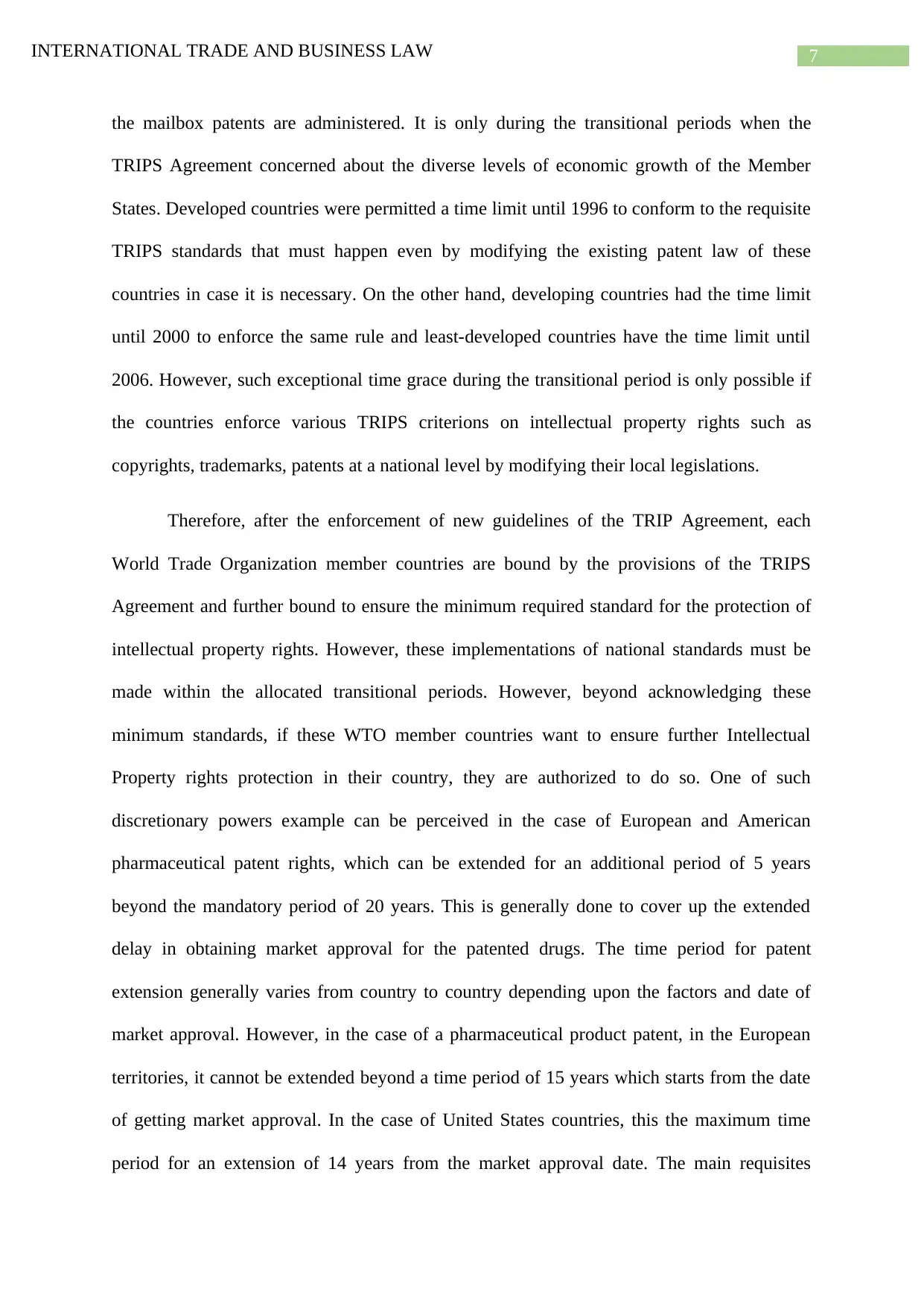
7INTERNATIONAL TRADE AND BUSINESS LAW
the mailbox patents are administered. It is only during the transitional periods when the
TRIPS Agreement concerned about the diverse levels of economic growth of the Member
States. Developed countries were permitted a time limit until 1996 to conform to the requisite
TRIPS standards that must happen even by modifying the existing patent law of these
countries in case it is necessary. On the other hand, developing countries had the time limit
until 2000 to enforce the same rule and least-developed countries have the time limit until
2006. However, such exceptional time grace during the transitional period is only possible if
the countries enforce various TRIPS criterions on intellectual property rights such as
copyrights, trademarks, patents at a national level by modifying their local legislations.
Therefore, after the enforcement of new guidelines of the TRIP Agreement, each
World Trade Organization member countries are bound by the provisions of the TRIPS
Agreement and further bound to ensure the minimum required standard for the protection of
intellectual property rights. However, these implementations of national standards must be
made within the allocated transitional periods. However, beyond acknowledging these
minimum standards, if these WTO member countries want to ensure further Intellectual
Property rights protection in their country, they are authorized to do so. One of such
discretionary powers example can be perceived in the case of European and American
pharmaceutical patent rights, which can be extended for an additional period of 5 years
beyond the mandatory period of 20 years. This is generally done to cover up the extended
delay in obtaining market approval for the patented drugs. The time period for patent
extension generally varies from country to country depending upon the factors and date of
market approval. However, in the case of a pharmaceutical product patent, in the European
territories, it cannot be extended beyond a time period of 15 years which starts from the date
of getting market approval. In the case of United States countries, this the maximum time
period for an extension of 14 years from the market approval date. The main requisites
the mailbox patents are administered. It is only during the transitional periods when the
TRIPS Agreement concerned about the diverse levels of economic growth of the Member
States. Developed countries were permitted a time limit until 1996 to conform to the requisite
TRIPS standards that must happen even by modifying the existing patent law of these
countries in case it is necessary. On the other hand, developing countries had the time limit
until 2000 to enforce the same rule and least-developed countries have the time limit until
2006. However, such exceptional time grace during the transitional period is only possible if
the countries enforce various TRIPS criterions on intellectual property rights such as
copyrights, trademarks, patents at a national level by modifying their local legislations.
Therefore, after the enforcement of new guidelines of the TRIP Agreement, each
World Trade Organization member countries are bound by the provisions of the TRIPS
Agreement and further bound to ensure the minimum required standard for the protection of
intellectual property rights. However, these implementations of national standards must be
made within the allocated transitional periods. However, beyond acknowledging these
minimum standards, if these WTO member countries want to ensure further Intellectual
Property rights protection in their country, they are authorized to do so. One of such
discretionary powers example can be perceived in the case of European and American
pharmaceutical patent rights, which can be extended for an additional period of 5 years
beyond the mandatory period of 20 years. This is generally done to cover up the extended
delay in obtaining market approval for the patented drugs. The time period for patent
extension generally varies from country to country depending upon the factors and date of
market approval. However, in the case of a pharmaceutical product patent, in the European
territories, it cannot be extended beyond a time period of 15 years which starts from the date
of getting market approval. In the case of United States countries, this the maximum time
period for an extension of 14 years from the market approval date. The main requisites
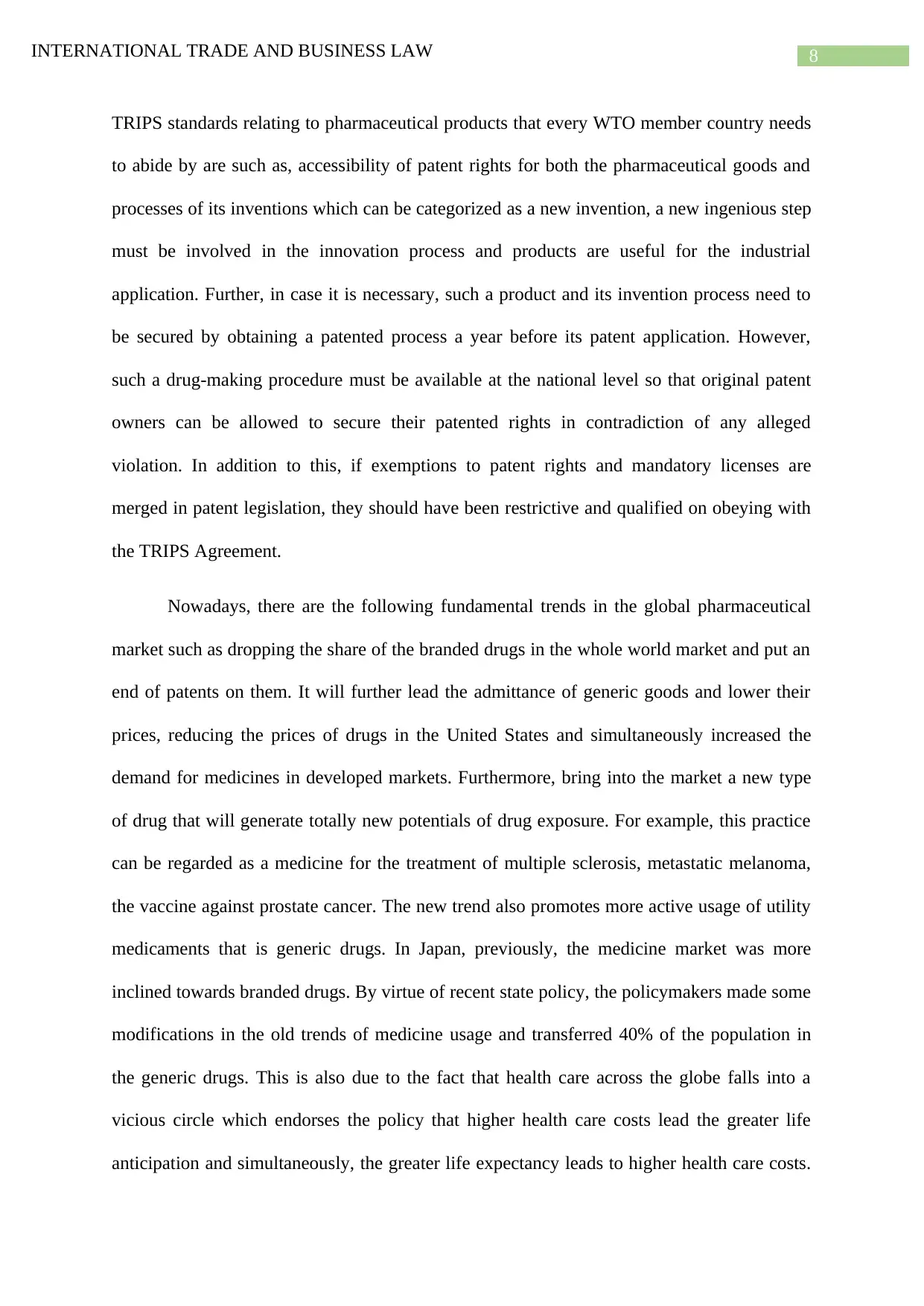
8INTERNATIONAL TRADE AND BUSINESS LAW
TRIPS standards relating to pharmaceutical products that every WTO member country needs
to abide by are such as, accessibility of patent rights for both the pharmaceutical goods and
processes of its inventions which can be categorized as a new invention, a new ingenious step
must be involved in the innovation process and products are useful for the industrial
application. Further, in case it is necessary, such a product and its invention process need to
be secured by obtaining a patented process a year before its patent application. However,
such a drug-making procedure must be available at the national level so that original patent
owners can be allowed to secure their patented rights in contradiction of any alleged
violation. In addition to this, if exemptions to patent rights and mandatory licenses are
merged in patent legislation, they should have been restrictive and qualified on obeying with
the TRIPS Agreement.
Nowadays, there are the following fundamental trends in the global pharmaceutical
market such as dropping the share of the branded drugs in the whole world market and put an
end of patents on them. It will further lead the admittance of generic goods and lower their
prices, reducing the prices of drugs in the United States and simultaneously increased the
demand for medicines in developed markets. Furthermore, bring into the market a new type
of drug that will generate totally new potentials of drug exposure. For example, this practice
can be regarded as a medicine for the treatment of multiple sclerosis, metastatic melanoma,
the vaccine against prostate cancer. The new trend also promotes more active usage of utility
medicaments that is generic drugs. In Japan, previously, the medicine market was more
inclined towards branded drugs. By virtue of recent state policy, the policymakers made some
modifications in the old trends of medicine usage and transferred 40% of the population in
the generic drugs. This is also due to the fact that health care across the globe falls into a
vicious circle which endorses the policy that higher health care costs lead the greater life
anticipation and simultaneously, the greater life expectancy leads to higher health care costs.
TRIPS standards relating to pharmaceutical products that every WTO member country needs
to abide by are such as, accessibility of patent rights for both the pharmaceutical goods and
processes of its inventions which can be categorized as a new invention, a new ingenious step
must be involved in the innovation process and products are useful for the industrial
application. Further, in case it is necessary, such a product and its invention process need to
be secured by obtaining a patented process a year before its patent application. However,
such a drug-making procedure must be available at the national level so that original patent
owners can be allowed to secure their patented rights in contradiction of any alleged
violation. In addition to this, if exemptions to patent rights and mandatory licenses are
merged in patent legislation, they should have been restrictive and qualified on obeying with
the TRIPS Agreement.
Nowadays, there are the following fundamental trends in the global pharmaceutical
market such as dropping the share of the branded drugs in the whole world market and put an
end of patents on them. It will further lead the admittance of generic goods and lower their
prices, reducing the prices of drugs in the United States and simultaneously increased the
demand for medicines in developed markets. Furthermore, bring into the market a new type
of drug that will generate totally new potentials of drug exposure. For example, this practice
can be regarded as a medicine for the treatment of multiple sclerosis, metastatic melanoma,
the vaccine against prostate cancer. The new trend also promotes more active usage of utility
medicaments that is generic drugs. In Japan, previously, the medicine market was more
inclined towards branded drugs. By virtue of recent state policy, the policymakers made some
modifications in the old trends of medicine usage and transferred 40% of the population in
the generic drugs. This is also due to the fact that health care across the globe falls into a
vicious circle which endorses the policy that higher health care costs lead the greater life
anticipation and simultaneously, the greater life expectancy leads to higher health care costs.
You're viewing a preview
Unlock full access by subscribing today!
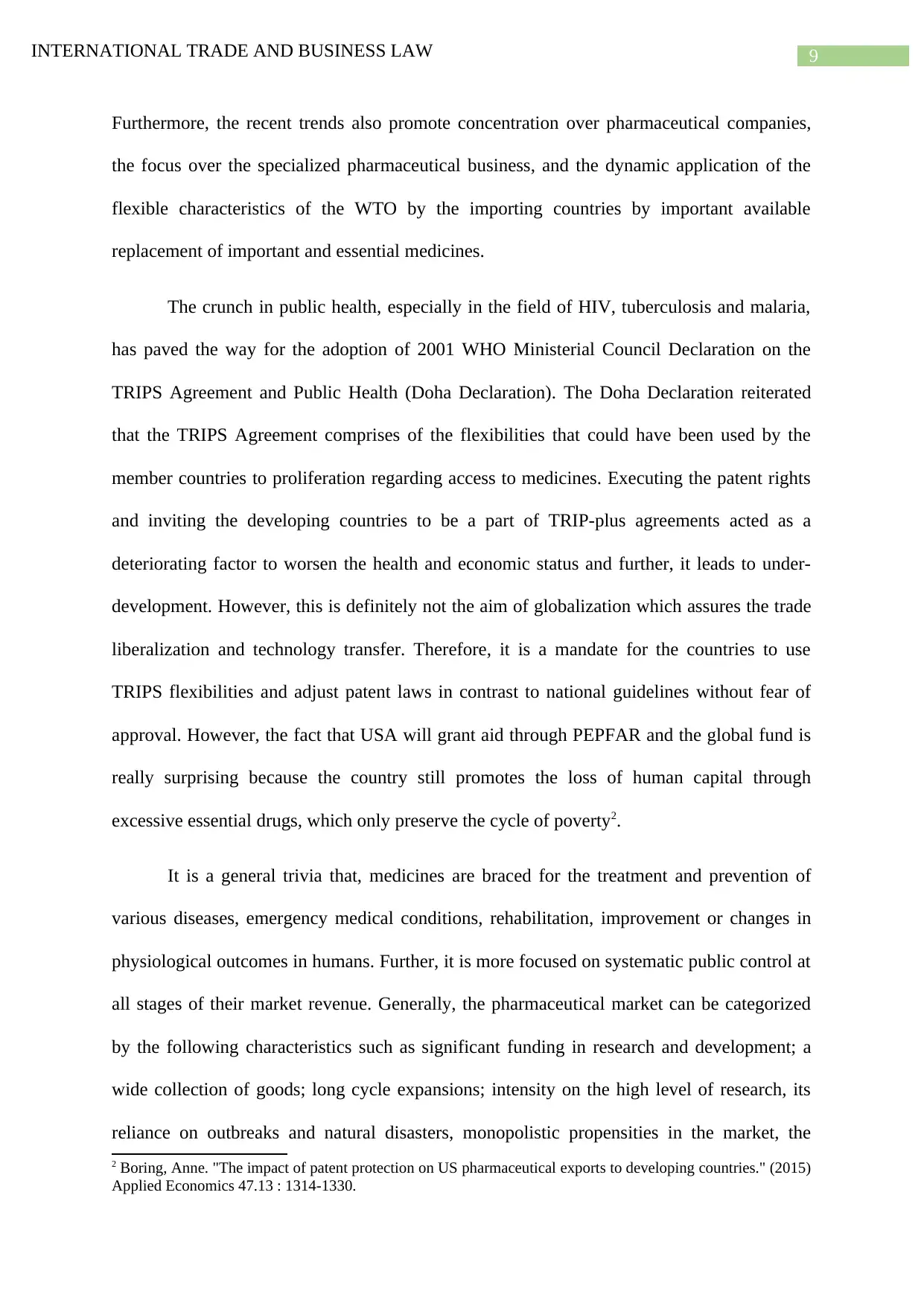
9INTERNATIONAL TRADE AND BUSINESS LAW
Furthermore, the recent trends also promote concentration over pharmaceutical companies,
the focus over the specialized pharmaceutical business, and the dynamic application of the
flexible characteristics of the WTO by the importing countries by important available
replacement of important and essential medicines.
The crunch in public health, especially in the field of HIV, tuberculosis and malaria,
has paved the way for the adoption of 2001 WHO Ministerial Council Declaration on the
TRIPS Agreement and Public Health (Doha Declaration). The Doha Declaration reiterated
that the TRIPS Agreement comprises of the flexibilities that could have been used by the
member countries to proliferation regarding access to medicines. Executing the patent rights
and inviting the developing countries to be a part of TRIP-plus agreements acted as a
deteriorating factor to worsen the health and economic status and further, it leads to under-
development. However, this is definitely not the aim of globalization which assures the trade
liberalization and technology transfer. Therefore, it is a mandate for the countries to use
TRIPS flexibilities and adjust patent laws in contrast to national guidelines without fear of
approval. However, the fact that USA will grant aid through PEPFAR and the global fund is
really surprising because the country still promotes the loss of human capital through
excessive essential drugs, which only preserve the cycle of poverty2.
It is a general trivia that, medicines are braced for the treatment and prevention of
various diseases, emergency medical conditions, rehabilitation, improvement or changes in
physiological outcomes in humans. Further, it is more focused on systematic public control at
all stages of their market revenue. Generally, the pharmaceutical market can be categorized
by the following characteristics such as significant funding in research and development; a
wide collection of goods; long cycle expansions; intensity on the high level of research, its
reliance on outbreaks and natural disasters, monopolistic propensities in the market, the
2 Boring, Anne. "The impact of patent protection on US pharmaceutical exports to developing countries." (2015)
Applied Economics 47.13 : 1314-1330.
Furthermore, the recent trends also promote concentration over pharmaceutical companies,
the focus over the specialized pharmaceutical business, and the dynamic application of the
flexible characteristics of the WTO by the importing countries by important available
replacement of important and essential medicines.
The crunch in public health, especially in the field of HIV, tuberculosis and malaria,
has paved the way for the adoption of 2001 WHO Ministerial Council Declaration on the
TRIPS Agreement and Public Health (Doha Declaration). The Doha Declaration reiterated
that the TRIPS Agreement comprises of the flexibilities that could have been used by the
member countries to proliferation regarding access to medicines. Executing the patent rights
and inviting the developing countries to be a part of TRIP-plus agreements acted as a
deteriorating factor to worsen the health and economic status and further, it leads to under-
development. However, this is definitely not the aim of globalization which assures the trade
liberalization and technology transfer. Therefore, it is a mandate for the countries to use
TRIPS flexibilities and adjust patent laws in contrast to national guidelines without fear of
approval. However, the fact that USA will grant aid through PEPFAR and the global fund is
really surprising because the country still promotes the loss of human capital through
excessive essential drugs, which only preserve the cycle of poverty2.
It is a general trivia that, medicines are braced for the treatment and prevention of
various diseases, emergency medical conditions, rehabilitation, improvement or changes in
physiological outcomes in humans. Further, it is more focused on systematic public control at
all stages of their market revenue. Generally, the pharmaceutical market can be categorized
by the following characteristics such as significant funding in research and development; a
wide collection of goods; long cycle expansions; intensity on the high level of research, its
reliance on outbreaks and natural disasters, monopolistic propensities in the market, the
2 Boring, Anne. "The impact of patent protection on US pharmaceutical exports to developing countries." (2015)
Applied Economics 47.13 : 1314-1330.
Paraphrase This Document
Need a fresh take? Get an instant paraphrase of this document with our AI Paraphraser
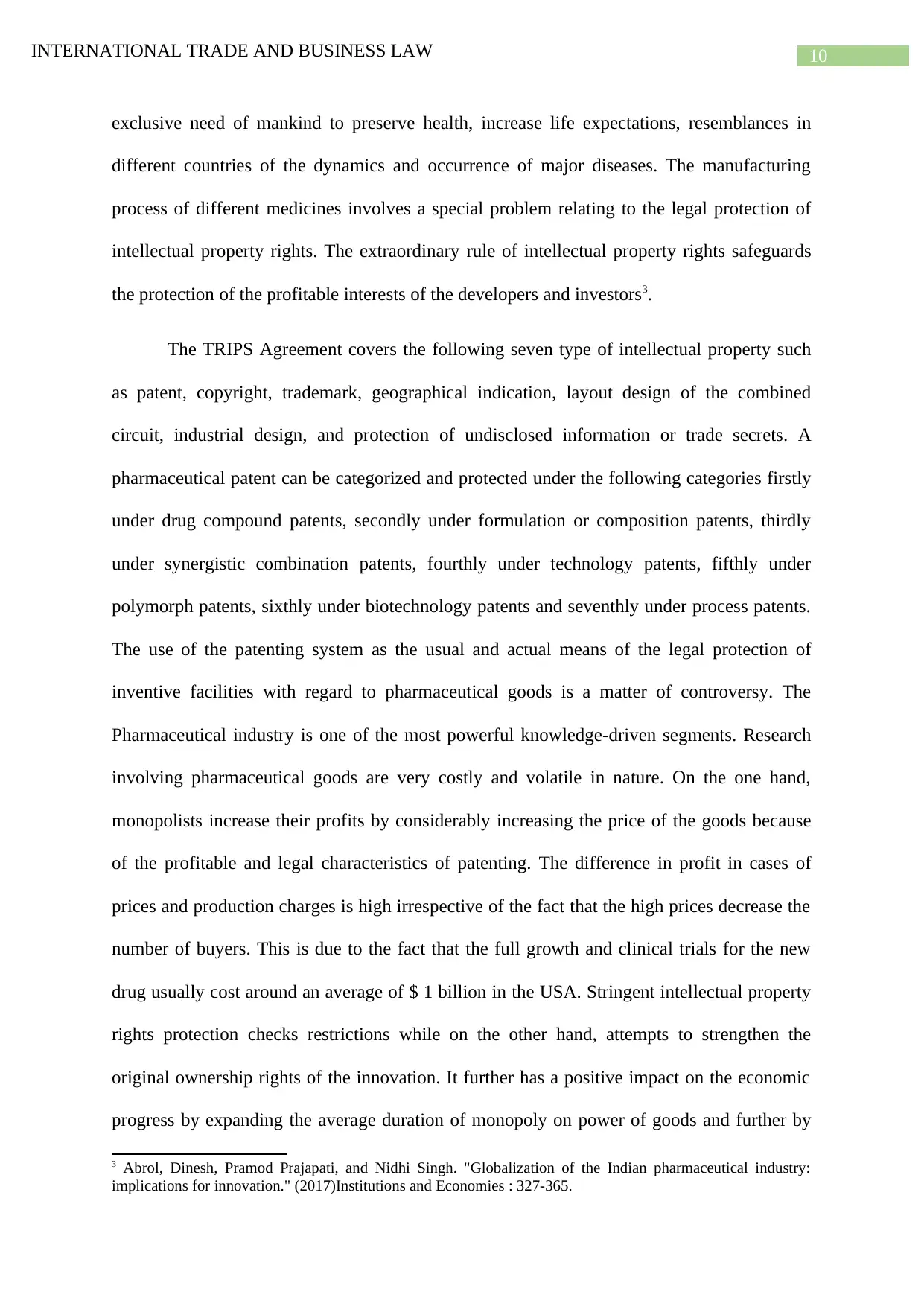
10INTERNATIONAL TRADE AND BUSINESS LAW
exclusive need of mankind to preserve health, increase life expectations, resemblances in
different countries of the dynamics and occurrence of major diseases. The manufacturing
process of different medicines involves a special problem relating to the legal protection of
intellectual property rights. The extraordinary rule of intellectual property rights safeguards
the protection of the profitable interests of the developers and investors3.
The TRIPS Agreement covers the following seven type of intellectual property such
as patent, copyright, trademark, geographical indication, layout design of the combined
circuit, industrial design, and protection of undisclosed information or trade secrets. A
pharmaceutical patent can be categorized and protected under the following categories firstly
under drug compound patents, secondly under formulation or composition patents, thirdly
under synergistic combination patents, fourthly under technology patents, fifthly under
polymorph patents, sixthly under biotechnology patents and seventhly under process patents.
The use of the patenting system as the usual and actual means of the legal protection of
inventive facilities with regard to pharmaceutical goods is a matter of controversy. The
Pharmaceutical industry is one of the most powerful knowledge-driven segments. Research
involving pharmaceutical goods are very costly and volatile in nature. On the one hand,
monopolists increase their profits by considerably increasing the price of the goods because
of the profitable and legal characteristics of patenting. The difference in profit in cases of
prices and production charges is high irrespective of the fact that the high prices decrease the
number of buyers. This is due to the fact that the full growth and clinical trials for the new
drug usually cost around an average of $ 1 billion in the USA. Stringent intellectual property
rights protection checks restrictions while on the other hand, attempts to strengthen the
original ownership rights of the innovation. It further has a positive impact on the economic
progress by expanding the average duration of monopoly on power of goods and further by
3 Abrol, Dinesh, Pramod Prajapati, and Nidhi Singh. "Globalization of the Indian pharmaceutical industry:
implications for innovation." (2017)Institutions and Economies : 327-365.
exclusive need of mankind to preserve health, increase life expectations, resemblances in
different countries of the dynamics and occurrence of major diseases. The manufacturing
process of different medicines involves a special problem relating to the legal protection of
intellectual property rights. The extraordinary rule of intellectual property rights safeguards
the protection of the profitable interests of the developers and investors3.
The TRIPS Agreement covers the following seven type of intellectual property such
as patent, copyright, trademark, geographical indication, layout design of the combined
circuit, industrial design, and protection of undisclosed information or trade secrets. A
pharmaceutical patent can be categorized and protected under the following categories firstly
under drug compound patents, secondly under formulation or composition patents, thirdly
under synergistic combination patents, fourthly under technology patents, fifthly under
polymorph patents, sixthly under biotechnology patents and seventhly under process patents.
The use of the patenting system as the usual and actual means of the legal protection of
inventive facilities with regard to pharmaceutical goods is a matter of controversy. The
Pharmaceutical industry is one of the most powerful knowledge-driven segments. Research
involving pharmaceutical goods are very costly and volatile in nature. On the one hand,
monopolists increase their profits by considerably increasing the price of the goods because
of the profitable and legal characteristics of patenting. The difference in profit in cases of
prices and production charges is high irrespective of the fact that the high prices decrease the
number of buyers. This is due to the fact that the full growth and clinical trials for the new
drug usually cost around an average of $ 1 billion in the USA. Stringent intellectual property
rights protection checks restrictions while on the other hand, attempts to strengthen the
original ownership rights of the innovation. It further has a positive impact on the economic
progress by expanding the average duration of monopoly on power of goods and further by
3 Abrol, Dinesh, Pramod Prajapati, and Nidhi Singh. "Globalization of the Indian pharmaceutical industry:
implications for innovation." (2017)Institutions and Economies : 327-365.
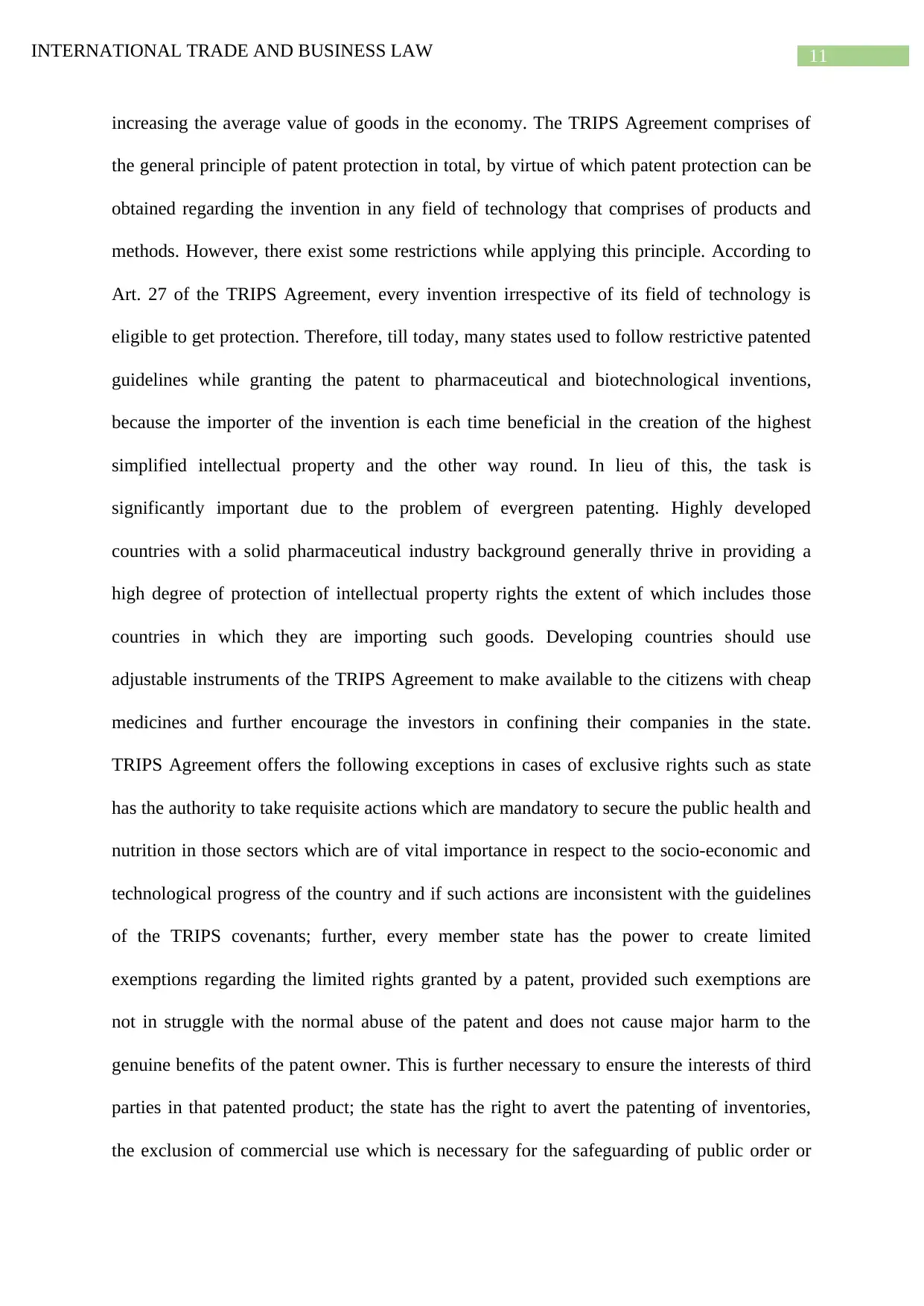
11INTERNATIONAL TRADE AND BUSINESS LAW
increasing the average value of goods in the economy. The TRIPS Agreement comprises of
the general principle of patent protection in total, by virtue of which patent protection can be
obtained regarding the invention in any field of technology that comprises of products and
methods. However, there exist some restrictions while applying this principle. According to
Art. 27 of the TRIPS Agreement, every invention irrespective of its field of technology is
eligible to get protection. Therefore, till today, many states used to follow restrictive patented
guidelines while granting the patent to pharmaceutical and biotechnological inventions,
because the importer of the invention is each time beneficial in the creation of the highest
simplified intellectual property and the other way round. In lieu of this, the task is
significantly important due to the problem of evergreen patenting. Highly developed
countries with a solid pharmaceutical industry background generally thrive in providing a
high degree of protection of intellectual property rights the extent of which includes those
countries in which they are importing such goods. Developing countries should use
adjustable instruments of the TRIPS Agreement to make available to the citizens with cheap
medicines and further encourage the investors in confining their companies in the state.
TRIPS Agreement offers the following exceptions in cases of exclusive rights such as state
has the authority to take requisite actions which are mandatory to secure the public health and
nutrition in those sectors which are of vital importance in respect to the socio-economic and
technological progress of the country and if such actions are inconsistent with the guidelines
of the TRIPS covenants; further, every member state has the power to create limited
exemptions regarding the limited rights granted by a patent, provided such exemptions are
not in struggle with the normal abuse of the patent and does not cause major harm to the
genuine benefits of the patent owner. This is further necessary to ensure the interests of third
parties in that patented product; the state has the right to avert the patenting of inventories,
the exclusion of commercial use which is necessary for the safeguarding of public order or
increasing the average value of goods in the economy. The TRIPS Agreement comprises of
the general principle of patent protection in total, by virtue of which patent protection can be
obtained regarding the invention in any field of technology that comprises of products and
methods. However, there exist some restrictions while applying this principle. According to
Art. 27 of the TRIPS Agreement, every invention irrespective of its field of technology is
eligible to get protection. Therefore, till today, many states used to follow restrictive patented
guidelines while granting the patent to pharmaceutical and biotechnological inventions,
because the importer of the invention is each time beneficial in the creation of the highest
simplified intellectual property and the other way round. In lieu of this, the task is
significantly important due to the problem of evergreen patenting. Highly developed
countries with a solid pharmaceutical industry background generally thrive in providing a
high degree of protection of intellectual property rights the extent of which includes those
countries in which they are importing such goods. Developing countries should use
adjustable instruments of the TRIPS Agreement to make available to the citizens with cheap
medicines and further encourage the investors in confining their companies in the state.
TRIPS Agreement offers the following exceptions in cases of exclusive rights such as state
has the authority to take requisite actions which are mandatory to secure the public health and
nutrition in those sectors which are of vital importance in respect to the socio-economic and
technological progress of the country and if such actions are inconsistent with the guidelines
of the TRIPS covenants; further, every member state has the power to create limited
exemptions regarding the limited rights granted by a patent, provided such exemptions are
not in struggle with the normal abuse of the patent and does not cause major harm to the
genuine benefits of the patent owner. This is further necessary to ensure the interests of third
parties in that patented product; the state has the right to avert the patenting of inventories,
the exclusion of commercial use which is necessary for the safeguarding of public order or
You're viewing a preview
Unlock full access by subscribing today!
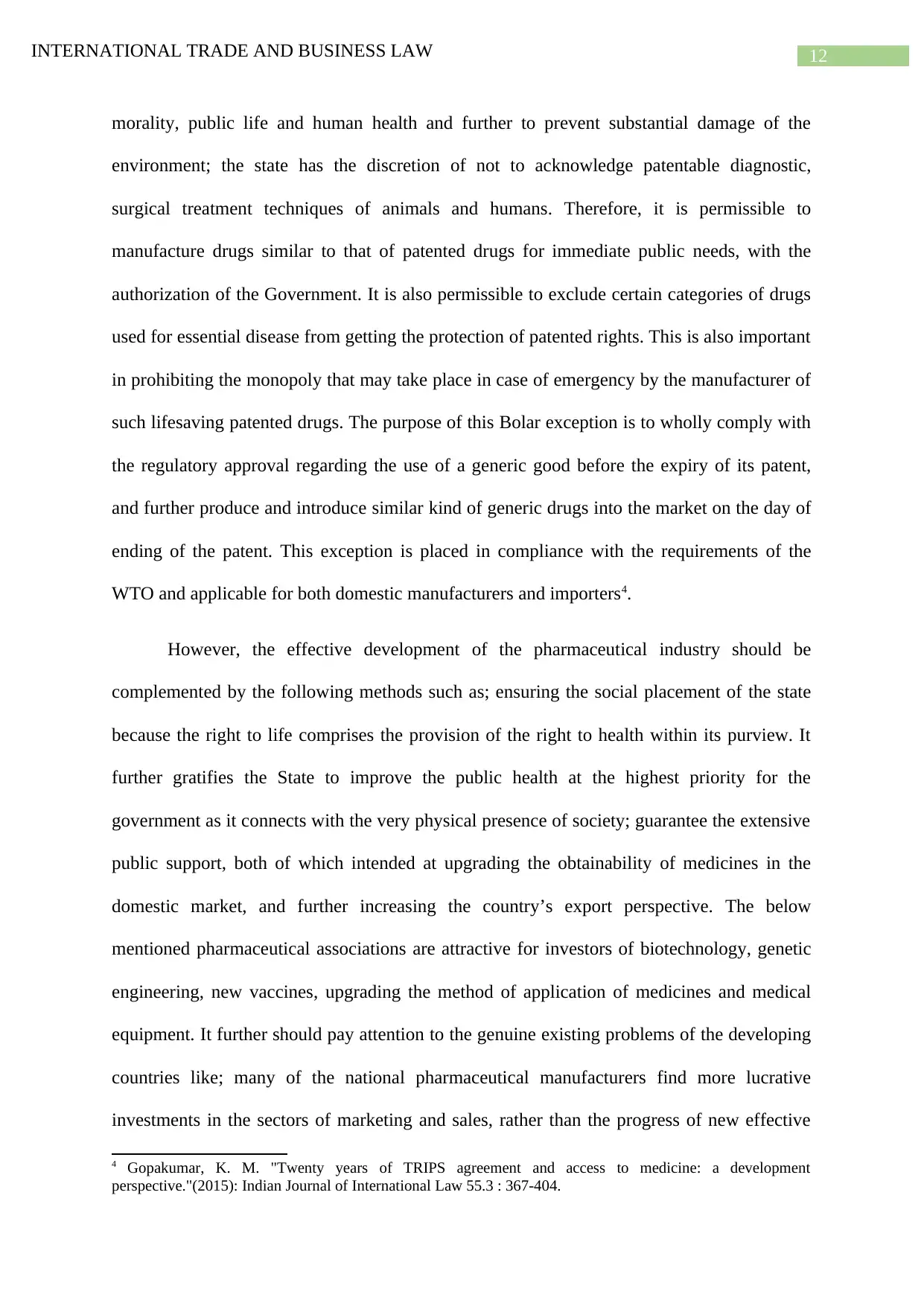
12INTERNATIONAL TRADE AND BUSINESS LAW
morality, public life and human health and further to prevent substantial damage of the
environment; the state has the discretion of not to acknowledge patentable diagnostic,
surgical treatment techniques of animals and humans. Therefore, it is permissible to
manufacture drugs similar to that of patented drugs for immediate public needs, with the
authorization of the Government. It is also permissible to exclude certain categories of drugs
used for essential disease from getting the protection of patented rights. This is also important
in prohibiting the monopoly that may take place in case of emergency by the manufacturer of
such lifesaving patented drugs. The purpose of this Bolar exception is to wholly comply with
the regulatory approval regarding the use of a generic good before the expiry of its patent,
and further produce and introduce similar kind of generic drugs into the market on the day of
ending of the patent. This exception is placed in compliance with the requirements of the
WTO and applicable for both domestic manufacturers and importers4.
However, the effective development of the pharmaceutical industry should be
complemented by the following methods such as; ensuring the social placement of the state
because the right to life comprises the provision of the right to health within its purview. It
further gratifies the State to improve the public health at the highest priority for the
government as it connects with the very physical presence of society; guarantee the extensive
public support, both of which intended at upgrading the obtainability of medicines in the
domestic market, and further increasing the country’s export perspective. The below
mentioned pharmaceutical associations are attractive for investors of biotechnology, genetic
engineering, new vaccines, upgrading the method of application of medicines and medical
equipment. It further should pay attention to the genuine existing problems of the developing
countries like; many of the national pharmaceutical manufacturers find more lucrative
investments in the sectors of marketing and sales, rather than the progress of new effective
4 Gopakumar, K. M. "Twenty years of TRIPS agreement and access to medicine: a development
perspective."(2015): Indian Journal of International Law 55.3 : 367-404.
morality, public life and human health and further to prevent substantial damage of the
environment; the state has the discretion of not to acknowledge patentable diagnostic,
surgical treatment techniques of animals and humans. Therefore, it is permissible to
manufacture drugs similar to that of patented drugs for immediate public needs, with the
authorization of the Government. It is also permissible to exclude certain categories of drugs
used for essential disease from getting the protection of patented rights. This is also important
in prohibiting the monopoly that may take place in case of emergency by the manufacturer of
such lifesaving patented drugs. The purpose of this Bolar exception is to wholly comply with
the regulatory approval regarding the use of a generic good before the expiry of its patent,
and further produce and introduce similar kind of generic drugs into the market on the day of
ending of the patent. This exception is placed in compliance with the requirements of the
WTO and applicable for both domestic manufacturers and importers4.
However, the effective development of the pharmaceutical industry should be
complemented by the following methods such as; ensuring the social placement of the state
because the right to life comprises the provision of the right to health within its purview. It
further gratifies the State to improve the public health at the highest priority for the
government as it connects with the very physical presence of society; guarantee the extensive
public support, both of which intended at upgrading the obtainability of medicines in the
domestic market, and further increasing the country’s export perspective. The below
mentioned pharmaceutical associations are attractive for investors of biotechnology, genetic
engineering, new vaccines, upgrading the method of application of medicines and medical
equipment. It further should pay attention to the genuine existing problems of the developing
countries like; many of the national pharmaceutical manufacturers find more lucrative
investments in the sectors of marketing and sales, rather than the progress of new effective
4 Gopakumar, K. M. "Twenty years of TRIPS agreement and access to medicine: a development
perspective."(2015): Indian Journal of International Law 55.3 : 367-404.
Paraphrase This Document
Need a fresh take? Get an instant paraphrase of this document with our AI Paraphraser
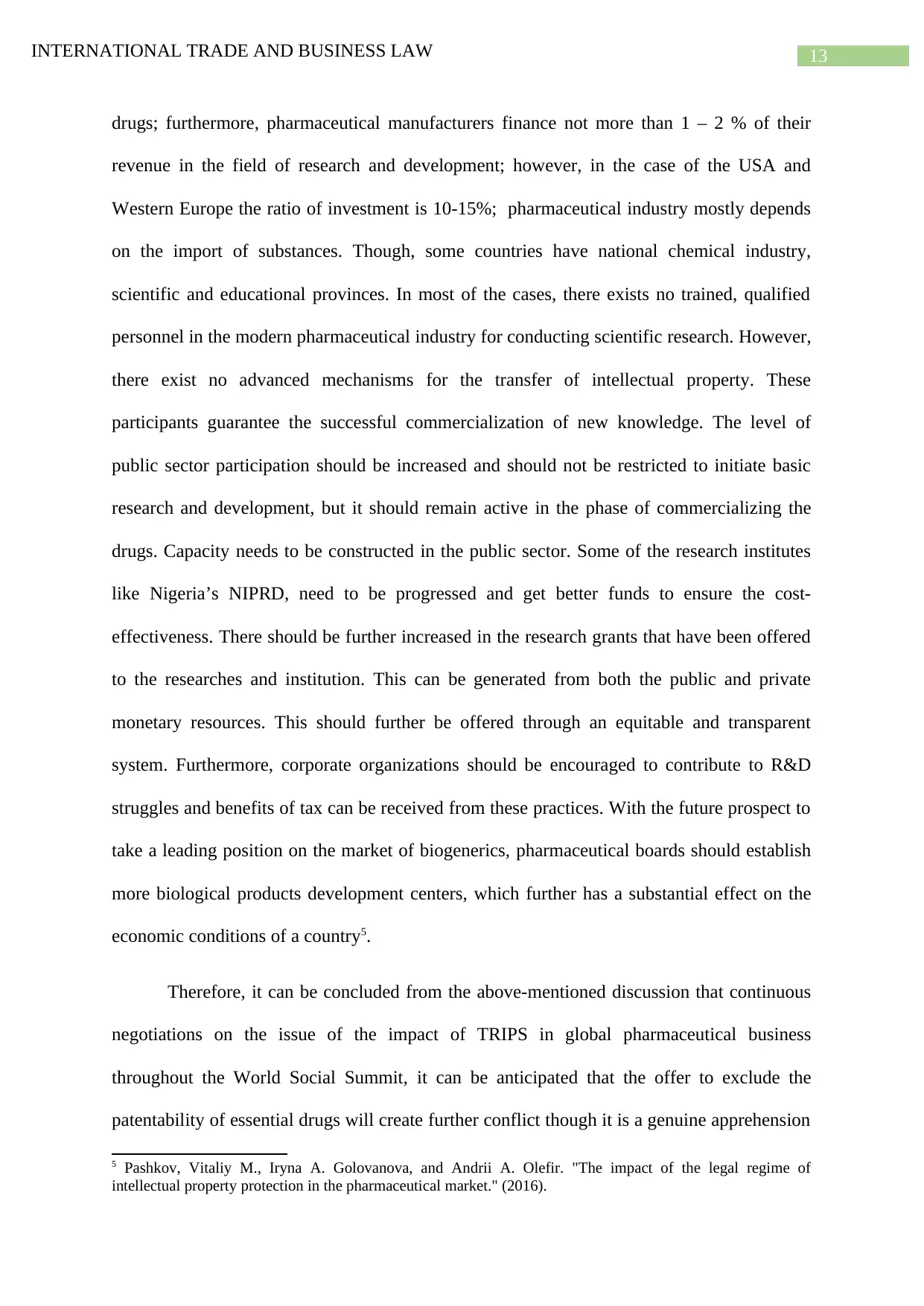
13INTERNATIONAL TRADE AND BUSINESS LAW
drugs; furthermore, pharmaceutical manufacturers finance not more than 1 – 2 % of their
revenue in the field of research and development; however, in the case of the USA and
Western Europe the ratio of investment is 10-15%; pharmaceutical industry mostly depends
on the import of substances. Though, some countries have national chemical industry,
scientific and educational provinces. In most of the cases, there exists no trained, qualified
personnel in the modern pharmaceutical industry for conducting scientific research. However,
there exist no advanced mechanisms for the transfer of intellectual property. These
participants guarantee the successful commercialization of new knowledge. The level of
public sector participation should be increased and should not be restricted to initiate basic
research and development, but it should remain active in the phase of commercializing the
drugs. Capacity needs to be constructed in the public sector. Some of the research institutes
like Nigeria’s NIPRD, need to be progressed and get better funds to ensure the cost-
effectiveness. There should be further increased in the research grants that have been offered
to the researches and institution. This can be generated from both the public and private
monetary resources. This should further be offered through an equitable and transparent
system. Furthermore, corporate organizations should be encouraged to contribute to R&D
struggles and benefits of tax can be received from these practices. With the future prospect to
take a leading position on the market of biogenerics, pharmaceutical boards should establish
more biological products development centers, which further has a substantial effect on the
economic conditions of a country5.
Therefore, it can be concluded from the above-mentioned discussion that continuous
negotiations on the issue of the impact of TRIPS in global pharmaceutical business
throughout the World Social Summit, it can be anticipated that the offer to exclude the
patentability of essential drugs will create further conflict though it is a genuine apprehension
5 Pashkov, Vitaliy M., Iryna A. Golovanova, and Andrii A. Olefir. "The impact of the legal regime of
intellectual property protection in the pharmaceutical market." (2016).
drugs; furthermore, pharmaceutical manufacturers finance not more than 1 – 2 % of their
revenue in the field of research and development; however, in the case of the USA and
Western Europe the ratio of investment is 10-15%; pharmaceutical industry mostly depends
on the import of substances. Though, some countries have national chemical industry,
scientific and educational provinces. In most of the cases, there exists no trained, qualified
personnel in the modern pharmaceutical industry for conducting scientific research. However,
there exist no advanced mechanisms for the transfer of intellectual property. These
participants guarantee the successful commercialization of new knowledge. The level of
public sector participation should be increased and should not be restricted to initiate basic
research and development, but it should remain active in the phase of commercializing the
drugs. Capacity needs to be constructed in the public sector. Some of the research institutes
like Nigeria’s NIPRD, need to be progressed and get better funds to ensure the cost-
effectiveness. There should be further increased in the research grants that have been offered
to the researches and institution. This can be generated from both the public and private
monetary resources. This should further be offered through an equitable and transparent
system. Furthermore, corporate organizations should be encouraged to contribute to R&D
struggles and benefits of tax can be received from these practices. With the future prospect to
take a leading position on the market of biogenerics, pharmaceutical boards should establish
more biological products development centers, which further has a substantial effect on the
economic conditions of a country5.
Therefore, it can be concluded from the above-mentioned discussion that continuous
negotiations on the issue of the impact of TRIPS in global pharmaceutical business
throughout the World Social Summit, it can be anticipated that the offer to exclude the
patentability of essential drugs will create further conflict though it is a genuine apprehension
5 Pashkov, Vitaliy M., Iryna A. Golovanova, and Andrii A. Olefir. "The impact of the legal regime of
intellectual property protection in the pharmaceutical market." (2016).
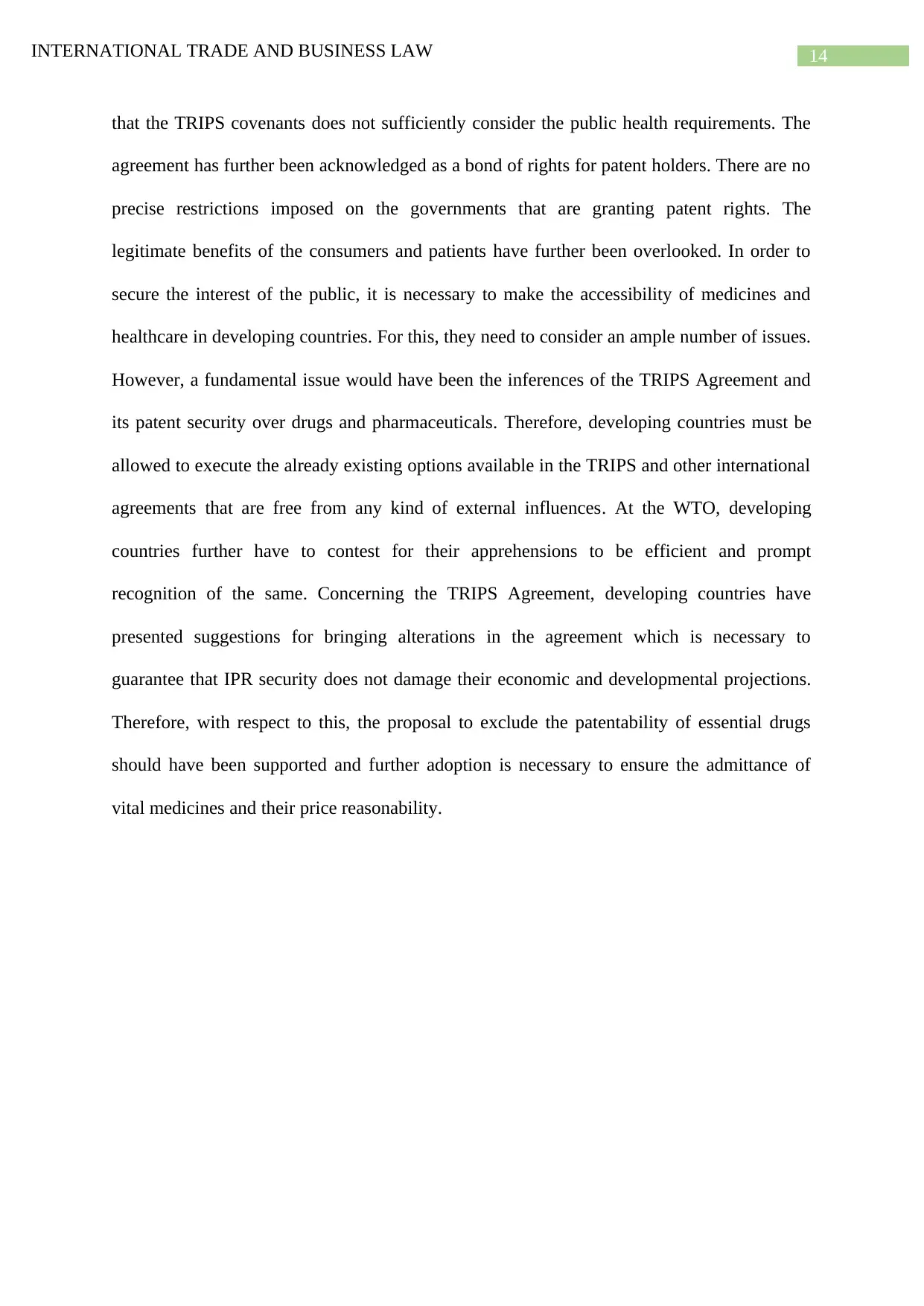
14INTERNATIONAL TRADE AND BUSINESS LAW
that the TRIPS covenants does not sufficiently consider the public health requirements. The
agreement has further been acknowledged as a bond of rights for patent holders. There are no
precise restrictions imposed on the governments that are granting patent rights. The
legitimate benefits of the consumers and patients have further been overlooked. In order to
secure the interest of the public, it is necessary to make the accessibility of medicines and
healthcare in developing countries. For this, they need to consider an ample number of issues.
However, a fundamental issue would have been the inferences of the TRIPS Agreement and
its patent security over drugs and pharmaceuticals. Therefore, developing countries must be
allowed to execute the already existing options available in the TRIPS and other international
agreements that are free from any kind of external influences. At the WTO, developing
countries further have to contest for their apprehensions to be efficient and prompt
recognition of the same. Concerning the TRIPS Agreement, developing countries have
presented suggestions for bringing alterations in the agreement which is necessary to
guarantee that IPR security does not damage their economic and developmental projections.
Therefore, with respect to this, the proposal to exclude the patentability of essential drugs
should have been supported and further adoption is necessary to ensure the admittance of
vital medicines and their price reasonability.
that the TRIPS covenants does not sufficiently consider the public health requirements. The
agreement has further been acknowledged as a bond of rights for patent holders. There are no
precise restrictions imposed on the governments that are granting patent rights. The
legitimate benefits of the consumers and patients have further been overlooked. In order to
secure the interest of the public, it is necessary to make the accessibility of medicines and
healthcare in developing countries. For this, they need to consider an ample number of issues.
However, a fundamental issue would have been the inferences of the TRIPS Agreement and
its patent security over drugs and pharmaceuticals. Therefore, developing countries must be
allowed to execute the already existing options available in the TRIPS and other international
agreements that are free from any kind of external influences. At the WTO, developing
countries further have to contest for their apprehensions to be efficient and prompt
recognition of the same. Concerning the TRIPS Agreement, developing countries have
presented suggestions for bringing alterations in the agreement which is necessary to
guarantee that IPR security does not damage their economic and developmental projections.
Therefore, with respect to this, the proposal to exclude the patentability of essential drugs
should have been supported and further adoption is necessary to ensure the admittance of
vital medicines and their price reasonability.
You're viewing a preview
Unlock full access by subscribing today!
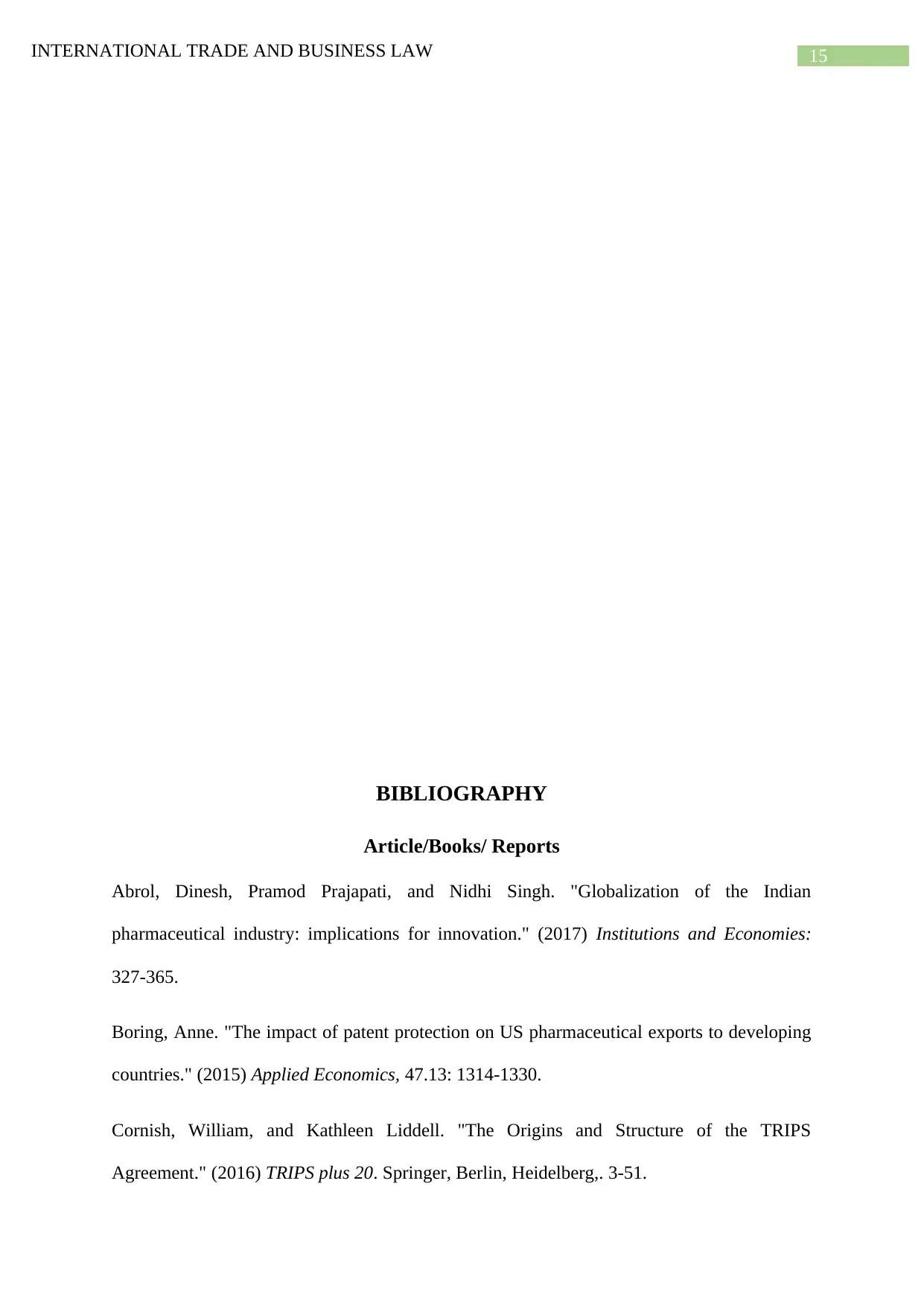
15INTERNATIONAL TRADE AND BUSINESS LAW
BIBLIOGRAPHY
Article/Books/ Reports
Abrol, Dinesh, Pramod Prajapati, and Nidhi Singh. "Globalization of the Indian
pharmaceutical industry: implications for innovation." (2017) Institutions and Economies:
327-365.
Boring, Anne. "The impact of patent protection on US pharmaceutical exports to developing
countries." (2015) Applied Economics, 47.13: 1314-1330.
Cornish, William, and Kathleen Liddell. "The Origins and Structure of the TRIPS
Agreement." (2016) TRIPS plus 20. Springer, Berlin, Heidelberg,. 3-51.
BIBLIOGRAPHY
Article/Books/ Reports
Abrol, Dinesh, Pramod Prajapati, and Nidhi Singh. "Globalization of the Indian
pharmaceutical industry: implications for innovation." (2017) Institutions and Economies:
327-365.
Boring, Anne. "The impact of patent protection on US pharmaceutical exports to developing
countries." (2015) Applied Economics, 47.13: 1314-1330.
Cornish, William, and Kathleen Liddell. "The Origins and Structure of the TRIPS
Agreement." (2016) TRIPS plus 20. Springer, Berlin, Heidelberg,. 3-51.
Paraphrase This Document
Need a fresh take? Get an instant paraphrase of this document with our AI Paraphraser
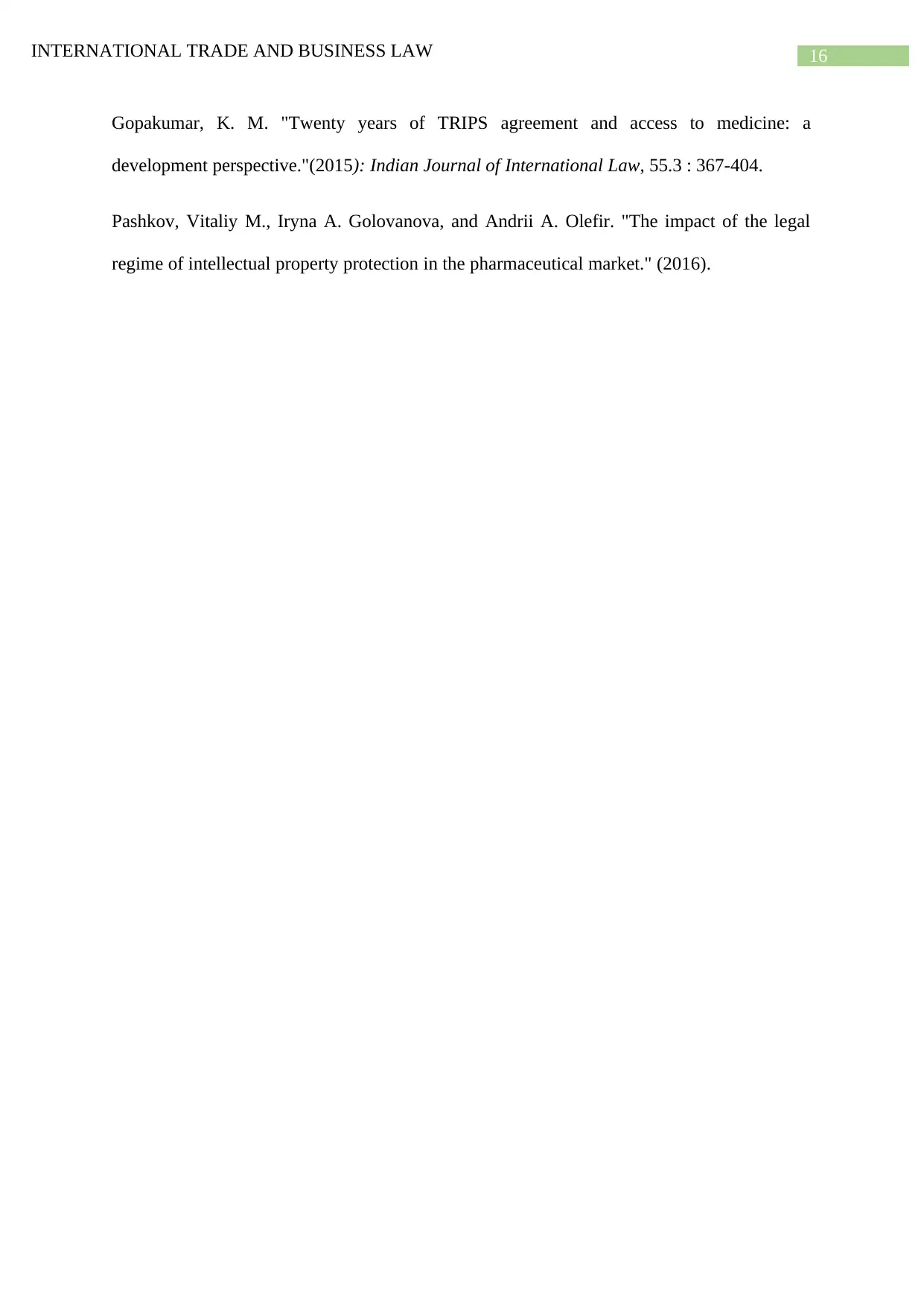
16INTERNATIONAL TRADE AND BUSINESS LAW
Gopakumar, K. M. "Twenty years of TRIPS agreement and access to medicine: a
development perspective."(2015): Indian Journal of International Law, 55.3 : 367-404.
Pashkov, Vitaliy M., Iryna A. Golovanova, and Andrii A. Olefir. "The impact of the legal
regime of intellectual property protection in the pharmaceutical market." (2016).
Gopakumar, K. M. "Twenty years of TRIPS agreement and access to medicine: a
development perspective."(2015): Indian Journal of International Law, 55.3 : 367-404.
Pashkov, Vitaliy M., Iryna A. Golovanova, and Andrii A. Olefir. "The impact of the legal
regime of intellectual property protection in the pharmaceutical market." (2016).
1 out of 17
Related Documents
Your All-in-One AI-Powered Toolkit for Academic Success.
+13062052269
info@desklib.com
Available 24*7 on WhatsApp / Email
![[object Object]](/_next/static/media/star-bottom.7253800d.svg)
Unlock your academic potential
© 2024 | Zucol Services PVT LTD | All rights reserved.




